|
We open the chubby bottle in the attic of the office. The night is not young: It’s crumpled, creased and cracked. It’s edgy, sweaty and sunk. We breathe in distilled grapes and distant hurricanes, Caribbean lightning flashes in our lungs, Calypso blues rumble within us. We huddle around the table and begin to drink. After the initial silence and poise, we begin to talk, tell tales about our love, lost or rejected. And, sometime, don’t know when, I see in your ocean eyes high waves, a peacock-blue of dreams and dragons. You don’t look into my eyes, as a decision. Then, he sings a lovelorn song, we all listen with our eyes shut and hearts open, and words fall into crevices. Like Medieval apothecaries we sit around the carcasses of our love, and examine the details of anatomy. We go away when the night is creaky and the moon is feeble. Then you call me to talk about your love, to praise him and his virtues, and you cry; I respond with my tears, for you. The next day, we blame everything on Captain Morgan.  Sabin Iqbal is an Indian journalist and writer. He has worked in newspapers and magazines in India and the UAE. He was Editorial Director of Kochi-Muziris Biennale, Senior Editor, Tehelka; Sr Assistant Editor, Business India and Editor, Sports Today. When he was a postgraduate student in University of Kerala in early 90s, his poems were published in a collection published by the British Council and Poetry Society India, and in Anand Bazar Patrika. He stopped writing poems for nearly two decades but has now begun working on a collection. He is an aspiring novelist.
1 Comment
I don’t know why my father decided to take the trip to Nainital by road, driving our white Ambassador in the middle of June. June was when we had our summer holidays, and that was the time we went to a hill-station for a few weeks, to spend family time together, enjoy the pleasant mountain air away from the intense Delhi heat, and generally return feeling we had done something other than chilling inside our cool bedrooms reading books and listening to music and eating stuffed potato paranthas made by Mom to pass vacation time. Now the Ambassador car is a family car, made to accommodate big Indian families, and three fat people can sit comfortably at the back. The driver can sit with two people next to him. Beyond that, even the Ambassador’s accommodating abilities are stretched. We were Dad (slim) driving, Mom (plump), three sisters of various ages from 12 to 9 (slim) of which I was one, a brother about 3 year old, and an Ayah whose body was equivalent to 2, and a half more, people. So we just about fitted in. It was not comfortable, especially for a long journey of about 300 kms, with the latter part of it over snaky mountain roads. However, before we came to the hilly roads, we had to tackle the plains. This was travel over undeveloped and bumpy roads for a large part. Travel by road was not such a popular ‘thing to-do’ in the days of my childhood. The cars, Ambassadors and Fiats, did not come with air-conditioners. We were seated asscheek-to-jowl, to stretch a figure of speech. It was hot, humid, and the pre-boiled and cooled drinking water in our plastic bottles was now near-boiling again. Dad did not believe in Coca Cola as a healthy drink, and the cold lemonade mother had in a couple of flasks for us, soon finished. We ate our packed, home-cooked ‘puri-aloo’ meal, and tried to make the best of it as Dad, his face flushed and hot under the afternoon sun, grappled with the roads of U.P., avoiding potholes and dirt roads as far as possible. We did not enjoy nor approve of this form of travel, but we could not protest. Mid-journey, I was tired, and put my head on Ayah’s shoulder to doze off. She already had my little brother on her lap and could not accommodate my head on her shoulder. She gently asked me to straighten up. Dad, squinting at the road, rivulets of sweat running down his eyes and cheeks, said, “There is no need for you to lean on her. Learn to be strong.” I straightened up and suffered, not leaning on any shoulder. It was a horrendous drive, but we did it then. Now, when we whizz across well laid out routes with air-conditioned cars being the norm rather than the exception, I think about this particular foray of ours and marvel at it. The skating, horse-riding, and sailing on Naini Lake made me forget the ordeal of getting there at that time. But I have not forgotten my father’s words.  Abha Iyengar is an award winning, internationally published poet, author, editor, translator, and a British Council certified creative writing mentor. Her story, The High Stool, was nominated for the Story South Million Writers Award. She received the Lavanya Sankaran Writing Fellowship for 2009-2010. Her poem-film, Parwaaz, won a Special Jury prize in Patras, Greece. She was a finalist in the FlashMob 2013 Flash Fiction contest. Her short fiction, The Marshlands, was shortlisted in the DNA-Out of Print short story contest 2015. Her poems have appeared in the Anthology of Contemporary Indian Poets and her fiction in The Indo-Australian Anthology of Short Fiction. Her published works include Yearnings, Flash Bites, Shrayan, Many Fish to Fry and The Gourd Seller and Other Stories. Letter 1 – Part 4 Hebron (Later.) Here I have been filling sheet upon sheet with my rambling thoughts and observations, and have said very little of our dear ones, about whom, I know, you thirst for intelligences most of all! I have mentioned how I believe you will take to the industrious Mrs O’Hair—well, certainly Agatha has. I often find her spying Mrs O from the hall or through the window, when she and her brother are to be playing out-of-doors to receive some air. Aggie seems most fascinated with the exotic Mrs O. I don’t believe either of the children had ever encountered an Irishwoman before. Of course Mrs O was not blind to Aggie’s fascination, and she began inviting her to assist her in her duties, especially in the kitchen, for Agatha’s edification—not to train our little girl to be a domestic! Of course not. But there are certain fundamental skills that are useful to possess no matter one’s station in life. I’m certain, my dear, that you agree on that point. For how can one evaluate a cook’s or a maid’s skillfulness if one has no base of knowledge from which to judge? I have always felt somewhat off my footing in such matters, relying principally on luck when employing necessary positions. Which is why I have availed myself of Mrs O’s clear expertises; and I, also, am being tutored, though not as directly as our Agatha. As I sit and stitch in the kitchen, I keep a keen eye on Mrs O’s procedures, committing them to memory until such time that I may record them in my journal. Except of course for those times I have been pointedly involved, as in the making of the currant jam. At first Mrs O was loathe to afford Aggie too much responsibility, undoubtedly feeling that she was too much of a child—she presents that image on account of her being small for her age. But Mrs O has come to accept that our Agatha is twelve, or nearly so, and hence is become a young lady. I daresay she will be out and married and raising a family of her own before we know what has happened. Though I must say it is difficult to imagine at times; when, for instance, she and Felix play knucklebones or nine-men’s-Morris in the alley; or when she carries with her on stormy nights Miss Buzzle, her ragdoll; or when she and Felix squabble over the most childish disputes, like who will receive the last bit of ice shavings to sweeten with molasses (you will recall what a treat the children count it, especially out little Maurice, who seemed to have a molasses tooth). Do not mistake me: The children are good. You can be proud of them in your absence. As I said, Agatha is become a young lady. When she assists Mrs O in the kitchen, she pins up her hair into a chestnut bun, and she dons an apron that Mrs O has fashioned just her size; and add the air of seriousness, and our Aggie could pass for mistress of her own house. I was struck with that image, again, just the other day, the day before Robin’s arrival, I believe. I said something in greeting when I entered the kitchen, and Aggie turned to me and there was a thumbprint of flour on her cheekbone; and something about it along with her hair swept from her face (classically heart-shaped, as you always said), and maybe, too, the grey shade of her frock’s collar—well, I was struck by the blue of her eyes. I remembered thinking of them as ‘glacial’ blue, which was odd for I have never been in the far northern part of the world, and I realized it was an adjective I must have extracted from one of Robin’s letters, though I couldn’t recall the phrase’s origin precisely. I thought that I must take up my brother’s correspondences from the bureau drawer in the parlor, and re-read them to satisfy my curiosity about the word in my vocabulary—for it may have gained entrance from some other source, from some book, for example. However, then I neglected to take up the letters, and the very next day Robin turned up in our foyer, as reborn as Lazarus. And Robin’s eyes, too, exhibited the exact icy-blue quality of Agatha’s—I take note of the similarity only now, in retrospect. (I must cease for the time being, dearest, and I could justify posting, for I have very nearly reached the terminus of this sheet—but I feel I must give Felix, out of maternal fairness, equal ‘stage time,’ as it were.) I believe the greatest change you will discover in Felix when you return is his bibliophilism. He always enjoyed being read to but in the past year his own passion for reading has become inflamed. Even when he is at play with his sister, in the alley or hall or parlor, he likes to have a book near at hand, almost as if comforted by it, the way Miss Buzzle comforts Agatha. I know you at times felt entombed by Uncle’s books when they arrived in two full carts and we had no choice but to stack them along the walls in every room, save the kitchen and washroom, for the modest bookcase in the parlor could hold but a thimbleful compared to the bucket that would be required. I further know your sometimes irksome disposition toward the stacks of books that haunt about the house was due to your disappointment in the settling of Uncle’s estate, but it is fortunate that Uncle bequeathed a significant portion of his library to me—largely books of poetry and romances—and not simply left everything to Robin, who surely would have liquidated the books along with everything else to finance his expedition; and they would be gone now too. The Benjamin Franklin must remain, yet I fear she may be in as sad of shape as her master, in which case she can only be auctioned in sections for her timber, and whichever gear survived. As you may conjecture, I have not broached such subjects with my brother. There is a trader in books in Marchmont Street, and now and then I have sold a volume or two. I must be watchful of course not to dispose of one of Felix’s favorites, the Sarah Fielding, for instance, or the John Gays. I wonder sometimes at Uncle’s tastes. Perhaps he was indiscriminate and purchased books as much for their mere availability as for their subject matter. Felix may have inherited the trait as his selections of material are remarkably eclectic; for a day or two favoring a novel, then a collection of verse, then drama. Oftentimes he is so ardent in his reading I am reluctant to force him to move on to other studies of a morning—yet I know how earnest you are to have him learn his figures, and geography. At present Felix is engaged in the Beggar’s Opera. His favored place is in the corner of the kitchen nearest to the washroom door, and next to a window of course. Mrs O’Hair will fix him his tea, with a splash of milk, as he prefers, and set it on the sill within easy reach from his chair. He will have rolled up the rug as a cushion for his feet, and if it’s an especially drafty morning he will place one of my shawls over his shoulders. He will then appear quite the little man, with his old book and tea and shawl. All he would require is a pipe to complete the tableau. Of course his hair hanging down and the perfect ivory of his hands and face falsify the impression. Mrs O’s pet-name for Felix is ‘Old Soul’. I am most definitely posting this letter today—this very moment in fact! I miss you terribly, my dear, and I trust that your business will conclude soon and you will return to us. Yours Forever, M  Ted Morrissey is the author of four books of fiction as well as two books of scholarship. His works of fiction include the novels An Untimely Frost and Men of Winter, and the novellaWeeping with an Ancient God, which was named a Best Book of 2015 by Chicago Book Review. His stories, essays and reviews have appeared in more than forty publications. He teaches in the MFA in Writing program at Lindenwood University. He lives near Springfield, Illinois, where he and his wife Melissa, an educator and children’s author, direct Twelve Winters Press. Poetry Kalathara Gopan (Translated from the Malayalam original 'Mukhathu Ninnum Vaayichathu' by Jose Varghese) No one would pay any attention to the face of a man who committed suicide. His friends would move away and weep in a corner, unable to muster the courage to even have a look at him. Those who came just to keep up appearances would peep through the busy crowd to see if there's scope for some flesh that excites as his wife wails, unaware that her sari is often in disarray. Someone would inform his father that it's time for the cremation, even as the latter busies himself making a cricket bat from the stem of a coconut frond, or a toy windmill with its leaf, just the way he did it when his son was a small child. His mother, even as she cries loudly, would sense the contentment of breastfeeding him. In the end, some would put together what's seen and heard, and share it, posing as philosophers. His old love would quickly separate his kisses from her husband's and just have a passing glance towards him. But someone might read from his face that last moment when he expressed his lust for life. Then, just like someone with his bladder full would run for a pee, he would feel he couldn't hold suicide within him anymore.  Born in 1972 at Kalathara, Thiruvananthapuram, Kerala, Kalathara Gopan started writing poems in the nineties. He has three poetry collections to his credit - `Athu ningalanu’ (It's You), ` Chirakilolippicha pena’ (The Pen Hidden In Wings,) and 'Parannu ninnu meen pidikkunnava' (Those Ones Catching Fish While Floating In The Air). Some of his poems are already translated to English. In monochrome, we walked the Kenyan beach. The moon, huge, low and brilliant dazzled everything to black and white. We walked east for twenty minutes, turned to walk back, scanning the sand for turtle tracks. No sign of anything save for our arms brushing. Here, no light pollution is permitted to scare things that won’t stand the light of day. We hoped the untouched beach would lure them. We stepped on through shoreline scrub made solid by shadows. On the sea, phosphorescence flared. ‘This is rare,’ he said. ‘We are lucky.’ Westwards, his shadow swallowed mine, made us one new shape, moving over cooled sand, to the sea’s sighing.  Emma-Jane Hughes was brought up between the sublime of a barge on the River Thames, and the ridiculous of an all-girls boarding school. She spent her childhood tucked in the cabins of a variety of small boats, reading, impervious to the scenery. Emma currently lives in Chichester where she teaches English and Creative Writing at the University of Chichester, and she is working on her PhD in Contemporary Poetry. Her previous publishing credits include The Bridport Prize anthologies 2012 and 2014, and the MSlexia online magazine. Her first full collection will be published by Cinnamon Press in Spring 2017. Sometime after Scooter Scutaro had his first chinstrap mishap and before he regretted wearing a thong, he concluded that the furry lifestyle has its limitations. He experienced a lucid flash of insight that made him realize something essential about human nature, but just as he was about to reflect upon it, someone flung a cup of Dr. Pepper at him and his epiphany vanished as sugary fizz dribbled through the mesh mouth that served as both his only air source and his sole view to the outside world. What was it about a molded plastic camel that made people want to pelt its humps? But then, dear God no, the field house filled with who let the dogs out (woof, woof, woof, woof)! and someone was shoving Scooter toward the pulsating lights and unsteady pyramid of cheerleaders. Sleeping in a microwave during August in the Everglades would have been cool compared to the sauna trapped inside his suit. If he had peed himself, he wouldn’t have been able to tell. Scooter gyrated his humps spasmodically, like he was trying to put a fire out with his ass. The crowd went wild, roaring camera flashes and dog whistles. It had started out so innocently. Furries are people who like to dress up in animal costumes. Not all furries are plushies, who like cuddly toys, sometimes specially adapted for pleasure, like the unicorn with the miracle horn, or the teddy who can hardly bear it, but most plushophiles are furries. Dirty furverts. Like the ones at a Fur Convention yiffing in a huge collective pile until their fur is matted with spooge and they have transcended their individual selves to lounge in an upper echelon of enlightened post-bodily awareness. Scooter, only son of Vespa Scutaro, famed condiment collector of Staten Island, happened to be a furry and a plushy, but generally didn’t go in for anything more than your usual petting, hugging and skritching. Just light scratching and grooming. Like you might do with your friends at a social gathering. So when he answered the ad looking for “an energetic keeper of the spirit stick” who got to wear a hirsute camel suit, he had thought it would be the perfect opportunity to meet some new furry friends. After days of tingly anticipation for the first game, Scooter jammed his body into the vacuum formed ABS plastic head of a grinning camel and pranced out in front of a gymnasium full of rabid Division III basketball fans chanting “Airball! Airball” in unison every few possessions. Scooter was bummed. Not a single furogenous zone to tickle, no one to give his humps a proper rubdown. What good was wearing oversize leathery kneepads, if he couldn’t spend the afternoon kneeling? But no, he was required to dance on command during the timeouts, working up such lather that his whole celery stalk body would grow sodden before he could take a breath. Then he glimpsed the lovely furry grizzly, the divine visiting mascot. She had oversize bear paws and foam in all the right places. He saw his chance and busted a move, slaloming his way towards her, oversized head swaying, cloven hoofs thumping, damp fingers desperately working the furry paws to push aside the popcorn vendors and little girls squealing to high-five him. Away, trollops! He stiff-armed them aside mercilessly, his Bactrian body undulating, his vision blurred with high fructose corn syrup, until he arrived at the she-bear’s side, primed for action. She wiggled; he waggled. She raised the roof; he picked strawberries. She roared; he reared up and went for it, grabbing at her haunches like the Alpha Furry. He had never felt more yiffy, ripe and ready for some hot fur-on-fur friction. He had bonded with frogs and ferrets, Hello Kitties and Smurfettes, but never a grizzly, never in front of so many cheering fans egging him on. In harried lust he thrust and parried, flounced and pounced, feeling the synthetic fibers on his body vibrate with keen purpose. Yes! Oh yes! Oh sweet mother of Minnie Mouse! Scooter was in thrall, about to unleash the beast, when his legs were swept out from under him and he crashed, humps-first, to the bottom of the bleachers. Two burly security guards pinned him to the hardwood. He looked back at his mascot mate, her paw clawing the air in a sad but lascivious farewell. This, Scooter realized while dragged kicking from the arena, had to be true love. 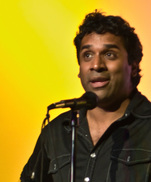 Ravi Shankar is founding editor of Drunken Boat, and teaches for the New York Writers Workshop. He has published or edited 10 books and chapbooks of poetry. Along with Tina Chang and Nathalie Handal, he edited W.W. Norton’s Language for a New Century: Contemporary Poetry from Asia, the Middle East & Beyond. He has won a Pushcart Prize, been featured in The New York Times and The Paris Review, appeared as a commentator on the BBC, the PBS Newshour and NPR, received fellowships from the MacDowell Colony and the Corporation of Yaddo, and has performed his work around the world. Letter 1 – Part 3 Ekron My occupation seems to be this letter-writing, if not this letter itself. I find I do not want to put aside the quill and tend to responsibilities. And when I do, when necessity requires it, I find that I am thinking of it, itching to return to it. I have heard stories of the opium fiends, the men (and women) who are possessed by a desire for the drug, no matter its deleterious qualities. I can now relate to that possession. Writing seems to have unlocked something in me. I can only pray that it will not prove as destructive as a burning thirst for the fruits of the poppy. (I know I have not posted, but again I find myself only partway down a page, thus, my dear, to avoid the waste . . .) The aroma of Mr Smythe’s Oriental tobacco wafted indoors as the kitchen windows were raised to let some air circulate. Mrs O and I were preparing vegetables to add to the simmering stock, whose richness competed with the bowls of tobacco. With the windows raised a quarter, between chops and scrapes of Mrs O’s and my blades, I overheard the pipe-smokers’ conversation. Mr S dominated the discussion (which I expected, given my brother’s taciturnity since his return). Mr S had served King and country in the Colonies, and he was relating a tale that he experienced ‘in the wilds of Nova Scotia.’ The Indians there—Mr S pronounced the tribe’s name but I shan’t attempt to spell it—had a legend of some beast that lived in the forest, some creature that walked upon two legs, like a man, and was even reported to speak the names of his victims before dispatching them most horrifically. Mr S acknowledged that he was yet a young man and still possessed of an overly romantic fancy, so he was prone to believe such tales more than he ought. He was assigned to escort a supply caravan to Fort Sackville, which required a three days’ hike through the woods. On the first day, light began to fade by midafternoon, so impenetrable were the woods and so far north. This particular band of Indians always kept dogs, and when they made camp the dogs would place themselves about its perimeter. The ragtag assembly of His Majesty’s foot-soldiers, native guides, and a pair of French trappers who served as linguists settled in for the long arboreal night, building their cook fire, preparing food and tea, and unpacking their bedrolls. The moment darkness descended in total, the dogs—great furry creatures, said Mr S, some northern relation of the English mastiff—they became on edge and watchful. Their wide, shaggy backsides shone in the golden firelight as they sat upon their haunches and stared ever so keenly into the blackness that surrounded them. The soldiers and the trappers attempted to disregard the dogs, who would emit every now and then a low growl, but their Indian masters were most attune to the dogs’ behavior. The Indians were as quiet as Anglicans at prayer, sipping their tea and keeping their fingers only inches from their long-bladed knives and war-hatchets. Mr S fell asleep, utterly exhausted from the hike and the Frenchmen’s homemade spirits that they’d packed—only to awake later to some sort of disturbance. It was still the blackest hours of night, and the Indians were fully alert, standing with backs to one another, their weapons drawn. Their big dogs were on their feet menacing the darkness with their rumbling growls. Mr Smythe took up his musket, not bothering to load it but brandishing its bayonet. I must say, I was slow in my vegetable preparation as I was enthralled by our neighbor’s tale. I’m afraid that was the climax of it, however. The camp eventually settled—though no one returned to sleep, Mr S assured my brother. There were some language barriers, but Mr S came to understand from the Indians, filtered through the Frenchmen into broken English, that they believed they had had an encounter with ‘the Hairy Man of the Forest’—the being who had plagued their people for generations. They further believed it was only the presence of their powerful dogs that dissuaded the Hairy Man from entering their camp. Mr S had been long of wind, and his story had taken some time to tell—but he had clearly reached its end, and by conventional rules it was Robin’s turn to respond in some verbal way. Yet a silence ensued. I realized that even Mrs O was quiet at her chopping as she too must’ve been spellbound by our neighbor’s narrative. From my vantage I couldn’t quite see the interlocutors. However, if I looked through the window, toward the left, I could see their pipes’ upward columns of smoke; and when a few seconds of long-enduring silence stretched itself out, I spied that Robin’s column was behaving most queerly, rising in a zigzag pattern as if a writhing serpent of steam. I leaned so that I had a fuller view and I saw that Robin’s hand which held the pipe was trembling rather violently. I hastened to exit the kitchen and as I did I heard Mr S questioning my brother as to his disposition. I was momentarily at Robin’s side. How to describe him? As I have said, his hand trembled, yes, as did his entire body; or perhaps more accurately, his entire being—for one received the impression that even his soul vibrated with whatever had taken hold of him. He stared into the space before him but not seeing the doors and windows of the close-quartered houses, as tight together as barrel staves, yet seeing something else, something terrible, for his brow was knit in a contortion of horror. I swear, his hair and beard, though now neatly trimmed, had turned a hoarier white, as if he’d aged while sitting in the alley, smoking and listening to our neighbor’s strange story. It may be that a pallor had come to his countenance, beneath the beard, and it had magnified the strands of white. It occurred to me that someone looking upon the scene may believe at a glance that Mr Smythe and Robin are contemporaries—yet my brother is but thirty years old. I considered for a moment that my arithmetic must be in error, he seemed so aged before my eyes there in the alley. The figure is quite correct, however. Mr S removed the pipe from Robin’s trembling grip (his fingers were solidly locked around the bowl), and I coaxed him to stand. It required a moment’s urging but he did finally rise and allow me to assist him indoors. I thanked Mr S for his kindnesses, over my shoulder, and wished him a good evening. I believe he felt responsible as the instrument of Robin’s petrification, but I did not believe him at fault. There is no question that Robin returned to us with a fragile constitution—Mr S could not have known that an interesting traveler’s tale would have such an affect on Robin, himself now a man of the wide world. No doubt our neighbor was hoping to prompt Robin into sharing some intriguing narrative of his own journeys, tit for tat—something to bring some color to Mr S’s typically monochromatic day. Robin’s reaction recalled for me the behaviors of some of the men who fought against the Colonies in their rebellion. I was still a girl when they began to come home in their inglorious defeat. In particular I recall the son of our neighbors, the Wadkinses. On occasion he would accompany them when they came for tea. Nathan was his name. I was permitted to sit in the parlor as long as I did not speak. I remember observing Mr Nathan, who also was largely taciturn on these visitings, and it occurred to me there was something rather shattered about him. Not his physique, I mean—although he did appear to favor one leg—rather, his spirit or his persona was in pieces, like a china platter that has been dropped, and it lay upon the floor essentially in the pattern of its former self, but the pieces are no longer connected and some are angled oddly from the whole of the new composition, and here and there some small pieces may seem to be missing altogether. (There have been nights, when I silently looked upon the children in their beds, that I felt a bit like such a platter, now that I conjure the comparison.) So that is how I thought of Robin as I assisted him indoors: He resembled his former self, but there was something broken about him. I don’t want to alarm you, my dear; Robin is not violent, I am certain of it. Beneath whatever has affected him so profoundly, he is still the gentle, kindhearted brother whom I remember so fondly. And, to be sure, once he was seated in our cozy parlor, with a shawl upon his shoulders, though it was to ward off a chill that only he seemed to feel, and with a cup of Mrs O’s excellent tea—Robin became at peace again.  Ted Morrissey is the author of four books of fiction as well as two books of scholarship. His works of fiction include the novels An Untimely Frost and Men of Winter, and the novellaWeeping with an Ancient God, which was named a Best Book of 2015 by Chicago Book Review. His stories, essays and reviews have appeared in more than forty publications. He teaches in the MFA in Writing program at Lindenwood University. He lives near Springfield, Illinois, where he and his wife Melissa, an educator and children’s author, direct Twelve Winters Press. Sabeeha, the lady of the lotus 1. Her daughter gave her the red diary, with a sketch or a poem printed on each page, as a gift for her fifteenth wedding anniversary in February. She had a meeting that morning, and a formal dinner to attend in the evening. Her husband had a difficult day. He didn’t want to go. The next day she was at the airport at noon, to receive the Mother of the Nation who was coming home from a trip abroad. Later, a meeting at her sister-in-law’s house, to discuss the situation and progress of Muslim women. Her husband told her he’d had disturbing news. In the diary, she wrote: Just when I feel on the edge of a discovery – an illumination. Between then and June, after her opening entries, she used it only to write down the words of the songs she was learning. Her handwriting intertwined with the printed words and pictures on the pages. 2. June was a musical month. Her teacher, whom she called Khan Sahib, invited connoisseurs of classical music, including Shahid Ahmad, the editor of the literary journal Saqi, to hear her sing. She performed three raags – khambavati, anandi and des – without making a single mistake. Her teacher was quite satisfied, her husband was pleased, the audience impressed. She was thinking of her deadline: a text to be handed over to She the next morning. A musician from Bengal, Begum Jabbar, played the sitar very well. ** She sang khambavati and darbari. Her teacher was satisfied, she wasn’t. She missed a farewell party for her friend Jane who was going back to America. At the next session four days later, Begum Jabbar played well again, Khan Sahib sang well, and her songs were well-appreciated. Her husband was very pleased with her singing, her teacher exultant. ** Two days later, she was singing again at a concert; she didn’t feel she sang too well, her teacher was most dissatisfied. There was a series of dinners to attend before the music conference at the new Arts Council began. Amanat Ali and Fateh Ali were performing on the opening night, she enjoyed their recital; on the second, Nazakat Ali and Salamat Ali were good in parts, but she was bored by the vocal gymnastics of Roshanara, Queen of Song. . ** She started to learn the new darbari tarana. It was a composition by Tan Ras Khan. She tried to sing a thumri in bhairavi, with her own improvisations and embellishments, but she didn’t make it. She practiced darbari in the evening s for twenty minutes. She cancelled a party at her friend Suad’s, to practice a new malhar, but he made her sing anandi. ** She waited for him at 5.30 and he appeared at 8.30. She wanted to sing the malhar she’d learnt but instead he made her sing aiman and kedara. ** June was ending, and she had another deadline, for the Morning News this time. ** She wanted to sing malhar. He made her sing darbari. She wanted something new and he made her repeat old lessons. Then he started her on a new raag, mian ki todi. She practiced des and bhopali, shifted to bahaar, wanted to sing the rest of them, but he moved her to malhar. She’d hoped he’d teach her the new string, but he made her revise the oldest. She didn’t like them much. ** A full darbari with a new tarana, and a new khambavati at last. Satisfied (she writes). 3. She notes her deadlines in the diary, but she doesn’t write about driving her children to school in the mornings four miles from P.E.C.H.S to Clifton, or picking them up for lunch. She mentions the parties she attended, but not the night she came back laughing because the Portuguese Ambassador had called her the Maria Callas of Karachi. She doesn’t record the passing of the seasons, the walks to the lake in the mild evening breeze, the flowers and fruit she grows, or the frangipani fallen on wet grass or picked off the branch in the morning for her hair. 4. July. Khan Sahib arrived unexpectedly. She revised anandi, learnt a new khambavati. Some beautiful new improvisations: Satisfied ( she writes). ** A few days late, another unexpected visit. From Jahan Khan this time, her teacher’s maternal uncle. He started her on khambavati. Ai ri mi jagi piya bin sagri rain Jab se gaye mori sudh hu na leni , kaise kahun man ki batiyan….. Ustad Jahan Khan comes by regularly now (she writes). Her pages were filling up with the lyrics of the songs she learned. She was practising ornamentation, alankaar, in khambavati. 5. In August Ustad Jahan Khan brought her voice down to a lower pitch by half a note. She sang all her songs without the accompanying harmonium. The discovery amazed her and surprised everyone. She was not very satisfied with her voice at that pitch. The next day her teacher tried out the old raags at the new pitch, with only the tanpura. Every note was in tune. He will teach me morning raags in the morning (she writes) and come in the evening to teach me evening raags. 6. After trying out several raags in Khayal, Ustad Jahan Khan struck upon Dhrupad, which her husband liked very much. She started to learn Raag Durga in the Dhrupad mode, with the Khamach rhythm; unusual and rarely recognised. She sang with the pakhwavaj, a single, two-faced drum, instead of the usual paired tablas. Eri mai nand kunwar eri mai nand kunwar eri mai nand kunwar maaa-aai nand kunwar maa-aai nanda Her voice throbbed and soared. 7. When a blister appears on the first forefinger (she writes) it is a sign that you have achieved the perfect pitch. One hour a day should be set aside, sacredly, for the practice of taans and sur sadhan: the art of song. 8. Her children will remember the concerts in the garden on nights lit up by flares or by the moon, they remember the songs and remind her of them, when she sang what, and even the words and melodies. They sat around her as she sang, or listened from the open window. They learnt her songs like the grey African parrots in their aunt’s big cage, half-understanding the words; they delighted her by singing raags in the bath, but when she persuaded them to take formal lessons all but her middle daughter would run away. They will remember her favourite book: the The Lady of the Lotus, illustrated with classical miniatures: a story from her native Malwa, of Baz Bahadur and the poet-singer Roopmati, whose melancholy verses their mother set to music and sang. Years later, her son will find her a copy of the book she lost in transit, and find some of those verses. But it’s a new edition. Had I but known what pain with love would come, had I but known Jo main aisa jaanti preet ki ye dukh hoe I would have banished him by beat of drum, had I but known Nagar dhandora peetti preet na kariyo koe Did the rain fall that year of 1963? None of them remembers now: they think it never came. They remember, though, all the years she longed for rain and missed her native Malwa, and how she exulted when it finally fell. 9. After trying her voice out in several pitches, Ustad Jahan Khan brought it back to the original note. He said he’d been worrying over it for days. 10. So what did it mean to you, the singing? Her son will ask her as he transcribes, and reads back to her the words of her diary. She remembers it all, the rooms, the faces, the applause, the ecstasy and the fall. Expression, she will reply, and release. The poetry in the music is thought, and through singing I expressed those thoughts. Sometimes late at night the lady of the lotus will sing to herself, those songs, of rainfall, separation and exultation. Later, her son, who never wanted to, will also sing to find release. But one night, he will stop in mid-song, terrified of the audience around him and the failure of his voice, and swear he’ll never sing on stage again. He exchanges the ecstasy of music for the dry solace of thoughts; he’ll write, but he inherits from her the pursuit: of austere phrase, soaring note, throbbing pulse, blistered forefinger. 11. She abandoned the diary with a final, terse entry. 23rd Nov 1963. Dinner at Khan Sahib’s house. Music after dinner. Sang Darbari. No exhilaration after singing. After this, there are only poems, wedding songs and musical notations. 12 Antra in des: Sa sa re re re re ma ma ma ma pa pa pa ma pa pa Ma pa ni ni ni ni ni sa ni sa sa re ni dha ni pa Taan: re ma pa dha ma ga re/ga ni sa  Born and brought up in Karachi, Aamer Hussein studied for two years in the Nilgiris, India, before moving to London, aged 15, in 1970. He worked in the now defunct BCCI, took a degree in South Asian studies from SOAS, and later studied French, Philosophy and Psychoanalysis. He began to publish short fiction, reviews and articles in journals and anthologies in 1987. His first collection of stories, Mirror to the Sun, appeared in 1993, to be followed by three further collections – including Insomnia – and two novels, Another Gulmohar Tree (2009) and The Cloud Messenger (2011). His latest work is 37 Bridges and Other Stories (2013). He writes in both English and Urdu, still lives in London, and travels frequently to Pakistan. 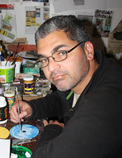 Gary Frier qualified as a Graphic Designer at the Cape Peninsula University of Technology in 2004. He is currently working as a freelance artist and teaching art at Zonnebloem childrens art centre and Valkenburg Psychiatric hospital. He also works for a local N.G.O. - the Observatory Neighbourhood Afterschool programme which provides educational and cultural programmes for youth at risk. His work can be found in these corporate collections, private and government: Old Mutual art collection, Bertha Foundation, Peuple et Culture – Brest (France) BP South Africa (Cape Town) Joop van den Ende Theater productions – Holland Embassy of USA, Nairobi, Western Cape Department of Economic development, and private collections worldwide as well. Artist statement I believe that making art is a compulsive act of self expression that can only be realized through the collaborative act of creating and experiencing. Creating art for me is about constantly reflecting on my place in the reality. I use art to express emotional, intellectual and tactile value, discovering how to distill and interpret my interaction with what surrounds me and documenting that personal relationship. With this in mind, my work is never produced on an assembly line. Every work is as unique as its prospective owner. So acquiring an artwork of mine is not just buying another product but rather more like airing a friendship GUANTANAMO ANTS --Shaker Aamer, British prisoner kept under solitary confinementfor almost three years I end up making friends With all kinds of creatures One of them being the ants Because they are beautiful The way they’re doing things; And I never knew how much Time I could spend with them, But I started watching them Learning about different ants, Their varied colours, and their Different ways of doing things, And it was beautiful  Cyril Dabydeen’s recent books include God’s Spider/poetry (Peepal Tree Press, UK), My Multi-Ethnic Friends and Other Stories (Guernica Editions, Toronto), and the anthology Beyond Sangre Grande: Caribbean Writing Today (Tsar/Mawenzi House, Toronto). Previous books include: Jogging in Havana (1992), Black Jesus and Other Stories (1996), Berbice Crossing (1997), My Brahmin Days (2000), North of the Equator (2001), Play a Song Somebody: New and Selected Short Stories (2003), Imaginary Origins: New and Selected Poems (2005),and the novel, Drums of My Flesh, 2007 ( nominated for the IMPAC/Dublin Prize, and winner of the International Guyana Prize for best novel). Cyril’s work has appeared in over 60 literary mags and anthologies, including the Oxford, Penguin and Heienemann Books of Caribbean Verse and Fiction. He has done over 300 readings internationally. He twice adjudicated for the Governor General’s Award (Poetry) and the USA Neustadt Prize for Literature (UOklahoma), et al. He is a former Poet Laureate of Ottawa (1984-87). He teaches Creative Writing at the UofOttawa. He was born in Guyana, S. America. Jorge Luis Borges said, “I have always imagined that Paradise will be a kind of library”. And rightly so, in that pursuit of not believing in the existence of paradise or the afterlife, and thus creating one such paradise on my own, much like the mythical Shadad did between the shadow and the soul, I have gone through a lot. I have been intimidated, harassed, provoked, and, more often than not, told that I am good for nothing. And all that, just for my love for books. So one day, when I returned from my school on a Friday, at 12, there was an uncertain rush in our house. It could have been best explained as a mad frenzy. I hurried to my room. I could not comprehend what was going on. From my room, which looked into the backyard, I saw papers falling down on grass from somewhere, and in less than a minute, they were strewn all across the ground. They glistened in the sun. The sheen they reflected was menacing. The old tin trunks in the attic had already been emptied. The gunny sacks draped in dust were thrown out through the high window. That was ten years ago. In the tin trucks, or gunnysacks , there were only books. Contrary to what one would be led to believe from the way I narrate my story, all books were not works of fiction, or poetry. There were books on religion. They were written in Urdu. And some of them, which I would later salvage from fire, were English translations of collected traditions. There were old newspapers. The colour of the paper had turned to pale yellow. They smelled of turpentine now. On Sundays I used to spend most of my time digging in the dirt sacks for more books. The pigeons were my company. The attic was my escape from the mediocrity of my father. He did not like me reading literature. Then, it was decided. The books would be thrown away. The attic will no longer stink of gasoline and pigeon shit. No one referred to books as books, and newspapers as newspapers. They were scrap to everyone. When the day arrived I watched everything in despair. I grew morose. They were at war with me. I was a lone fighter. They charged at the doors. They went up to the attic, in space. I stood close by, on the moon, looking at them in defeat. In two hours the whole contents of the attic was in the backyard. I ran hard. The newspapers were on fire. I was in tears. I said to father, ' let's talk it over... don't burn books… I want them. ' Forwhat? My library, my paradise. He didn't give in. I just had to salvage books from his violence. And I did, but not as many as 10 books. That day, I vowed to him. I will have my own library one day, and you will see it and I will tell you : look, you cannot burn my flowers now. You cannot pluck them and throw them away in dirt. Since that day, I have been collecting books. I have been contriving seashells, putting together my paradise, a bit of the sea, a bit of land.  Omair Bhat likes to think of himself as a memory keeper. Literature is to him what rain is to autumn. You can reach out to him at [email protected] Morning has broken open, bleeding into the river. The streetlamps are still on. Two swans float up in unhurried hunger for bread I do not have. Twenty-two huddle farther up the river asleep, their necks wrung into their wings. A lull of white feathers on which water does not stick. Their river is always dry. It is land. My river runs by me reflecting runners, dreams and detritus. A life of moorings and unmoorings, a mirror of semi-truths - where the light of a dog-pissed streetlamp looks like flecks of real gold. I stand still, very still. Watching my body ripple and quiver like a wildling. A swan passes by and I shatter into pixels. But I can wait, I have nowhere I need to be. The waters will calm, I will patch together again.  Pia Ghosh Roy grew up in India and now lives in Cambridge (UK). Her fiction and essays have been published in the UK and US. She was shortlisted for the 2015 Brighton Prize, longlisted for the 2015 Bath Short Story Award, and highly commended at the 2014 Words and Women Competition. She has worked in advertising as a copywriter in Kolkata, Mumbai, Bangalore and London. Pia is currently working on her first novel. Blog: Peppercorns in my Pocket / Twitter: @piaghoshroy Visual Art Pablo Solari 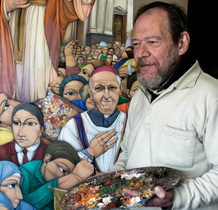 Pablo Solari was born in Buenos Aires, Argentina, in 1953. Since childhood, from the age of 4 years, he began to draw and paint, then attended a children's art school. At the age of 12, he decided to continue his studies on his own. He studied the Italian classics, the great masters Giotto, Raphael, Michelangelo, Caravaggio, Fra Angelico, and then incorporated them an American air. He calls his personal style "Interior Realism". His works portray the interior of the characters and objects, not the outside. Everything comes out of his imagination and memory, without copying anything absolutely. He sees the work in his mind, and turns directly on the blank canvas without preliminary drawing. It has its own color and compositional rules. He does not make preliminary sketches, but attempts to bring drawing to perfection. His preferred medium is oil painting on canvas, but tries out other mediums and techniques too. 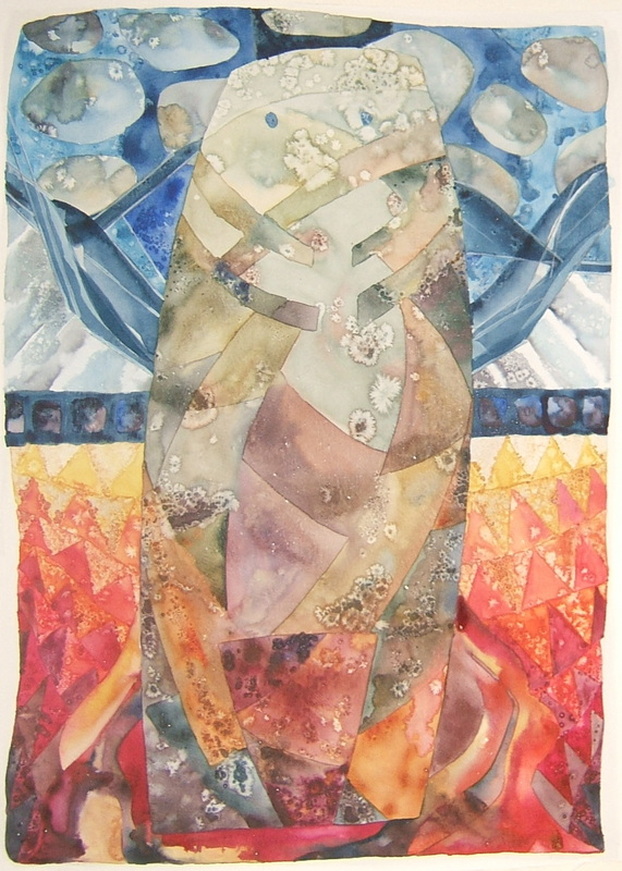 Buried in the blue mountains, a stone lies incarnadined, fecund. It is I, goddess of passion, primeval woman, raring to birth the world. A lush labyrinth of triangles, decoding desire in core mantra; a lotus energy shrine in bee-hive matrix; my fluid spring, an ever fertile hum; my mouth hungry, devouring time. I am the womb of the universe, in dark hues of darkling bronze. I am Kamakhya, flaming in camphor, adorned in stars; my breath, the living air. Invoke me in word, whisper, thought and dream. I shall appear in apparition and oracle, allegory and parable, rising in monsoon spate, flooding the earth with my primal blood, staining the sky with visions of dark eternity. My psychic song flows in your veins, carrying promises of verses to come. I am infinite soul spilling forth in countless forms, my endless female hungers wooing the heavens. I am laden cloud, twilight rain, water in its element; a ritual beyond time, bleeding in cosmic myth. {Kamakhya is the presiding deity of the Kamakhya temple in Kamrup, Assam. Translated from Assamese as the goddess of desire, Kamakhya is said to be a Tantric goddess, associated with Kali and Durga.} THREADS ACROSS WATERS is a collaboration between the British artist Carola Colley and the Indian born British poet Usha Kishore. This art project is Carola’s response to Usha’s poetry. The project is a vibrant mixture of painting in oil and watercolour, mixed media print, sculpture and poetry. This is the second collaborative project between Usha and Carola, both of whom share a fascination for myth, particularly in the exploration of female mythical figures and in the feminist interpretation of myth. Both are also pre-occupied with cross-cultural aspects of myth, involving mythical characters and their transcultural avatars, whether Indian, Celtic, Norse, Graeco-Roman or Chinese. The idea of weaving together aspects of the physical and metaphysical concepts run parallel in the works of both Usha and Carola. A joint exhibition is held at The Mill Gallery, Banbury, Oxfordshire (UK) from Tuesday 4th Oct to Tuesday 1st November 2016, with a poetry workshop and reading on the 15th of October.  Usha Kishore Indian born Usha Kishore is a poet, editor and translator from the Sanskrit, resident on the Isle of Man, where she teaches English at Queen Elizabeth II High School. Kishore has been anthologised by Macmillan, Hodder Wayland, Oxford University Press and Harper Collins among others. Her work has appeared in international journals like Asia Literary Review, Index on Censorship, Indian Literature, Pirene’s Fountain, Poetry Salzburg Review, South Asian Ensemble, South Asian Review, The Stinging Fly and The Warwick Review. Kishore’s recent prizes include the winner of the Exiled Writers Ink Poetry Competition, UK (2014), the Pre-Raphaelite Poetry Prize, UK (2013) and highly commended in the Gregory O’Donoghue Poetry Competition, Ireland (2015, 2014 & 2013). Her poetry has been part of international projects and features in the British Primary and Indian Middle School syllabi. Winner of an Arts Council Award and a Culture Vannin Award, Kishore is the author of two poetry collections, On Manannan’s Isle and Night Sky between the Stars and a book of translation from the Sanskrit, Translations of the Divine Woman. Currently Kishore is co-editing Home Thoughts, a British Indian diasporic poetry anthology with the Calcutta academic, Jaydeep Sarangi. www.ushakishore.co.uk 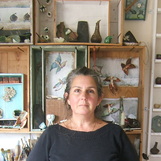 Carola Colley was born in Kuala Lumpur, Malaysia. She completed a degree in sculpture at Edinburgh College of Art, and from there spent several years living and working in Portugal and Hungary before settling on the Isle of Man in 1993 . Carola ran a continuous program of workshops for children, adults and SEBD children from the studio while exhibiting widely. She currently divides her time between studios in Banbury and Portugal, working in a variety of media. Her work is inspired both by direct observation and the history of landscape, and by weaving in elements of myth, memory and poetry. Letter 1 – Part 2 Etham In spite of being taken aback by Robin’s wasted appearance, Mr Smythe, no doubt due to his own loneliness and generally kind nature, invited him to smoke a bowl of tobacco with him after he’d had a chance to sup—‘a fine Indian cut,’ Mr S described it. I knew that Robin would decline, if for no other reason than he had never been attracted to tobacco—but he surprised me by accepting our neighbor’s invitation. I realized that my brother has no doubt taken up many new occupations during his years at sea, occupations to fill the countless empty hours among the desolate waves and phantasmagoric bergs of ice. My occupation seems to be this letter-writing, if not this letter itself. I find I do not want to put aside the quill and tend to responsibilities. And when I do, when necessity requires it, I find that I am thinking of it, itching to return to it. I have heard stories of the opium fiends, the men (and women) who are possessed by a desire for the drug, no matter its deleterious qualities. I can now relate to that possession. Writing seems to have unlocked something in me. I can only pray that it will not prove as destructive as a burning thirst for the fruits of the poppy. (I know I have not posted, but again I find myself only partway down a page, thus, my dear, to avoid the waste . . .) The aroma of Mr Smythe’s Oriental tobacco wafted indoors as the kitchen windows were raised to let some air circulate. Mrs O and I were preparing vegetables to add to the simmering stock, whose richness competed with the bowls of tobacco. With the windows raised a quarter, between chops and scrapes of Mrs O’s and my blades, I overheard the pipe-smokers’ conversation. Mr S dominated the discussion (which I expected, given my brother’s taciturnity since his return). Mr S had served King and country in the Colonies, and he was relating a tale that he experienced ‘in the wilds of Nova Scotia.’ The Indians there—Mr S pronounced the tribe’s name but I shan’t attempt to spell it—had a legend of some beast that lived in the forest, some creature that walked upon two legs, like a man, and was even reported to speak the names of his victims before dispatching them most horrifically. Mr S acknowledged that he was yet a young man and still possessed of an overly romantic fancy, so he was prone to believe such tales more than he ought. He was assigned to escort a supply caravan to Fort Sackville, which required a three days’ hike through the woods. On the first day, light began to fade by midafternoon, so impenetrable were the woods and so far north. This particular band of Indians always kept dogs, and when they made camp the dogs would place themselves about its perimeter. The ragtag assembly of His Majesty’s foot-soldiers, native guides, and a pair of French trappers who served as linguists settled in for the long arboreal night, building their cook fire, preparing food and tea, and unpacking their bedrolls. The moment darkness descended in total, the dogs—great furry creatures, said Mr S, some northern relation of the English mastiff—they became on edge and watchful. Their wide, shaggy backsides shone in the golden firelight as they sat upon their haunches and stared ever so keenly into the blackness that surrounded them. The soldiers and the trappers attempted to disregard the dogs, who would emit every now and then a low growl, but their Indian masters were most attune to the dogs’ behavior. The Indians were as quiet as Anglicans at prayer, sipping their tea and keeping their fingers only inches from their long-bladed knives and war-hatchets. Mr S fell asleep, utterly exhausted from the hike and the Frenchmen’s homemade spirits that they’d packed—only to awake later to some sort of disturbance. It was still the blackest hours of night, and the Indians were fully alert, standing with backs to one another, their weapons drawn. Their big dogs were on their feet menacing the darkness with their rumbling growls. Mr Smythe took up his musket, not bothering to load it but brandishing its bayonet. I must say, I was slow in my vegetable preparation as I was enthralled by our neighbor’s tale. I’m afraid that was the climax of it, however. The camp eventually settled—though no one returned to sleep, Mr S assured my brother. There were some language barriers, but Mr S came to understand from the Indians, filtered through the Frenchmen into broken English, that they believed they had had an encounter with ‘the Hairy Man of the Forest’—the being who had plagued their people for generations. They further believed it was only the presence of their powerful dogs that dissuaded the Hairy Man from entering their camp. Mr S had been long of wind, and his story had taken some time to tell—but he had clearly reached its end, and by conventional rules it was Robin’s turn to respond in some verbal way. Yet a silence ensued. I realized that even Mrs O was quiet at her chopping as she too must’ve been spellbound by our neighbor’s narrative. From my vantage I couldn’t quite see the interlocutors. However, if I looked through the window, toward the left, I could see their pipes’ upward columns of smoke; and when a few seconds of long-enduring silence stretched itself out, I spied that Robin’s column was behaving most queerly, rising in a zigzag pattern as if a writhing serpent of steam. I leaned so that I had a fuller view and I saw that Robin’s hand which held the pipe was trembling rather violently. I hastened to exit the kitchen and as I did I heard Mr S questioning my brother as to his disposition. I was momentarily at Robin’s side. How to describe him? As I have said, his hand trembled, yes, as did his entire body; or perhaps more accurately, his entire being—for one received the impression that even his soul vibrated with whatever had taken hold of him. He stared into the space before him but not seeing the doors and windows of the close-quartered houses, as tight together as barrel staves, yet seeing something else, something terrible, for his brow was knit in a contortion of horror. I swear, his hair and beard, though now neatly trimmed, had turned a hoarier white, as if he’d aged while sitting in the alley, smoking and listening to our neighbor’s strange story. It may be that a pallor had come to his countenance, beneath the beard, and it had magnified the strands of white. It occurred to me that someone looking upon the scene may believe at a glance that Mr Smythe and Robin are contemporaries—yet my brother is but thirty years old. I considered for a moment that my arithmetic must be in error, he seemed so aged before my eyes there in the alley. The figure is quite correct, however. Mr S removed the pipe from Robin’s trembling grip (his fingers were solidly locked around the bowl), and I coaxed him to stand. It required a moment’s urging but he did finally rise and allow me to assist him indoors. I thanked Mr S for his kindnesses, over my shoulder, and wished him a good evening. I believe he felt responsible as the instrument of Robin’s petrification, but I did not believe him at fault. There is no question that Robin returned to us with a fragile constitution—Mr S could not have known that an interesting traveler’s tale would have such an affect on Robin, himself now a man of the wide world. No doubt our neighbor was hoping to prompt Robin into sharing some intriguing narrative of his own journeys, tit for tat—something to bring some color to Mr S’s typically monochromatic day. Robin’s reaction recalled for me the behaviors of some of the men who fought against the Colonies in their rebellion. I was still a girl when they began to come home in their inglorious defeat. In particular I recall the son of our neighbors, the Wadkinses. On occasion he would accompany them when they came for tea. Nathan was his name. I was permitted to sit in the parlor as long as I did not speak. I remember observing Mr Nathan, who also was largely taciturn on these visitings, and it occurred to me there was something rather shattered about him. Not his physique, I mean—although he did appear to favor one leg—rather, his spirit or his persona was in pieces, like a china platter that has been dropped, and it lay upon the floor essentially in the pattern of its former self, but the pieces are no longer connected and some are angled oddly from the whole of the new composition, and here and there some small pieces may seem to be missing altogether. (There have been nights, when I silently looked upon the children in their beds, that I felt a bit like such a platter, now that I conjure the comparison.) So that is how I thought of Robin as I assisted him indoors: He resembled his former self, but there was something broken about him. I don’t want to alarm you, my dear; Robin is not violent, I am certain of it. Beneath whatever has affected him so profoundly, he is still the gentle, kindhearted brother whom I remember so fondly. And, to be sure, once he was seated in our cozy parlor, with a shawl upon his shoulders, though it was to ward off a chill that only he seemed to feel, and with a cup of Mrs O’s excellent tea—Robin became at peace again. (Later.) Here I have been filling sheet upon sheet with my rambling thoughts and observations, and have said very little of our dear ones, about whom, I know, you thirst for intelligences most of all! I have mentioned how I believe you will take to the industrious Mrs O’Hair—well, certainly Agatha has. I often find her spying Mrs O from the hall or through the window, when she and her brother are to be playing out-of-doors to receive some air. Aggie seems most fascinated with the exotic Mrs O. I don’t believe either of the children had ever encountered an Irishwoman before. Of course Mrs O was not blind to Aggie’s fascination, and she began inviting her to assist her in her duties, especially in the kitchen, for Agatha’s edification—not to train our little girl to be a domestic! Of course not. But there are certain fundamental skills that are useful to possess no matter one’s station in life. I’m certain, my dear, that you agree on that point. For how can one evaluate a cook’s or a maid’s skillfulness if one has no base of knowledge from which to judge? I have always felt somewhat off my footing in such matters, relying principally on luck when employing necessary positions. Which is why I have availed myself of Mrs O’s clear expertises; and I, also, am being tutored, though not as directly as our Agatha. As I sit and stitch in the kitchen, I keep a keen eye on Mrs O’s procedures, committing them to memory until such time that I may record them in my journal. Except of course for those times I have been pointedly involved, as in the making of the currant jam. At first Mrs O was loathe to afford Aggie too much responsibility, undoubtedly feeling that she was too much of a child—she presents that image on account of her being small for her age. But Mrs O has come to accept that our Agatha is twelve, or nearly so, and hence is become a young lady. I daresay she will be out and married and raising a family of her own before we know what has happened. Though I must say it is difficult to imagine at times; when, for instance, she and Felix play knucklebones or nine-men’s-Morris in the alley; or when she carries with her on stormy nights Miss Buzzle, her ragdoll; or when she and Felix squabble over the most childish disputes, like who will receive the last bit of ice shavings to sweeten with molasses (you will recall what a treat the children count it, especially out little Maurice, who seemed to have a molasses tooth). Do not mistake me: The children are good. You can be proud of them in your absence. As I said, Agatha is become a young lady. When she assists Mrs O in the kitchen, she pins up her hair into a chestnut bun, and she dons an apron that Mrs O has fashioned just her size; and add the air of seriousness, and our Aggie could pass for mistress of her own house. I was struck with that image, again, just the other day, the day before Robin’s arrival, I believe. I said something in greeting when I entered the kitchen, and Aggie turned to me and there was a thumbprint of flour on her cheekbone; and something about it along with her hair swept from her face (classically heart-shaped, as you always said), and maybe, too, the grey shade of her frock’s collar—well, I was struck by the blue of her eyes. I remembered thinking of them as ‘glacial’ blue, which was odd for I have never been in the far northern part of the world, and I realized it was an adjective I must have extracted from one of Robin’s letters, though I couldn’t recall the phrase’s origin precisely. I thought that I must take up my brother’s correspondences from the bureau drawer in the parlor, and re-read them to satisfy my curiosity about the word in my vocabulary—for it may have gained entrance from some other source, from some book, for example. However, then I neglected to take up the letters, and the very next day Robin turned up in our foyer, as reborn as Lazarus. And Robin’s eyes, too, exhibited the exact icy-blue quality of Agatha’s—I take note of the similarity only now, in retrospect. (I must cease for the time being, dearest, and I could justify posting, for I have very nearly reached the terminus of this sheet—but I feel I must give Felix, out of maternal fairness, equal ‘stage time,’ as it were.) I believe the greatest change you will discover in Felix when you return is his bibliophilism. He always enjoyed being read to but in the past year his own passion for reading has become inflamed. Even when he is at play with his sister, in the alley or hall or parlor, he likes to have a book near at hand, almost as if comforted by it, the way Miss Buzzle comforts Agatha. I know you at times felt entombed by Uncle’s books when they arrived in two full carts and we had no choice but to stack them along the walls in every room, save the kitchen and washroom, for the modest bookcase in the parlor could hold but a thimbleful compared to the bucket that would be required. I further know your sometimes irksome disposition toward the stacks of books that haunt about the house was due to your disappointment in the settling of Uncle’s estate, but it is fortunate that Uncle bequeathed a significant portion of his library to me—largely books of poetry and romances—and not simply left everything to Robin, who surely would have liquidated the books along with everything else to finance his expedition; and they would be gone now too. The Benjamin Franklin must remain, yet I fear she may be in as sad of shape as her master, in which case she can only be auctioned in sections for her timber, and whichever gear survived. As you may conjecture, I have not broached such subjects with my brother. There is a trader in books in Marchmont Street, and now and then I have sold a volume or two. I must be watchful of course not to dispose of one of Felix’s favorites, the Sarah Fielding, for instance, or the John Gays. I wonder sometimes at Uncle’s tastes. Perhaps he was indiscriminate and purchased books as much for their mere availability as for their subject matter. Felix may have inherited the trait as his selections of material are remarkably eclectic; for a day or two favoring a novel, then a collection of verse, then drama. Oftentimes he is so ardent in his reading I am reluctant to force him to move on to other studies of a morning—yet I know how earnest you are to have him learn his figures, and geography. At present Felix is engaged in the Beggar’s Opera. His favored place is in the corner of the kitchen nearest to the washroom door, and next to a window of course. Mrs O’Hair will fix him his tea, with a splash of milk, as he prefers, and set it on the sill within easy reach from his chair. He will have rolled up the rug as a cushion for his feet, and if it’s an especially drafty morning he will place one of my shawls over his shoulders. He will then appear quite the little man, with his old book and tea and shawl. All he would require is a pipe to complete the tableau. Of course his hair hanging down and the perfect ivory of his hands and face falsify the impression. Mrs O’s pet-name for Felix is ‘Old Soul’. I am most definitely posting this letter today—this very moment in fact! I miss you terribly, my dear, and I trust that your business will conclude soon and you will return to us. Yours Forever, M  Ted Morrissey is the author of four books of fiction as well as two books of scholarship. His works of fiction include the novels An Untimely Frost and Men of Winter, and the novellaWeeping with an Ancient God, which was named a Best Book of 2015 by Chicago Book Review. His stories, essays and reviews have appeared in more than forty publications. He teaches in the MFA in Writing program at Lindenwood University. He lives near Springfield, Illinois, where he and his wife Melissa, an educator and children’s author, direct Twelve Winters Press. 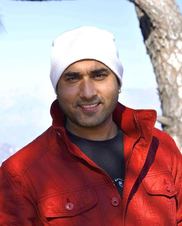 Abhijit Kumar Pathak Imagine looking at a canvas of sheer abstraction. Dots and lines and debris seem to brim and float. You gaze at it for a long time and then you want to close your eyes. As you close your eyes, colours, countless shapes, and images rise to the surface. Furthermore, you are consumed by all sorts of sensations, as if you are listening to music that you’ve never encountered. What is overriding is an indescribable sense of tranquility and comfort, as if passing time carries you to a peaceful and beautiful pastoral where you can sink into an abyss of quietude . Abhijit Kumar Pathak is a visual artist, trained at Banaras Hindu University & Jamia Millia Islamia New Delhi. He won a national award (2010) when he was only a post graduate student of Jamia Milia University. Pathak is an abstractionist with passion and deep conviction. His works are colour fields of infinitude in which we do not see a definite sense of process. But there is a deep understanding of the mystic rules of the beginning, middle and end; there are deeper truths of the variation of the principle of fragmentation and fragility in a world which begins with the gravity of the earth. As if he is an archaeologist who lives in the summation of his excavations, this young artist who hails from Varanasi is a practitioner of the deeper tunes of resonance that build and breathe within the windows of his inner reservoir. Earth colours, pigments, Acrylic colours, fabric, charcoal, and colour pencils - it is free association from the start to the finished state, kept alive by an intersection of physical experience, individual feeling and ideas of the deeper truths of living and reality .But there is also great lyricism. You won’t be surprised to know that he is a trained tabla player. He lives and works in Delhi. They float before my eyes like planets I long to reach, tiny white moons I want to crush to dust, the sound of chalk grinding to nothing on a blackboard. I place them on my tongue - Satan's host - the powdery taste of headaches. You stride away, lithe as a stork along the banks of the canal. I call to you that they are not sweets. You fling then the pills to the water. They do not sink but float like the spots, of a disease. On Chalcot Square you cross, as though I am a corpse you don't want to touch. On Arlington Road, the argument hums like the traffic between us. You pull a telephone receiver off the hook. It hangs on its flex like the head of a dead snake. I purchase another packet of paracetemol. I go to a bar in Camden Town to be alone and wash down the pills with cognac. Maybe I took too many, I suddenly think. Maybe twenty could actually kill me and I don't really want to die. I could change my mind. I ask the waitress to call me an ambulance and she gives me water and salt in a glass and the salt taste reminds me of Margaritas once in Paris in Montparnasse. At hospital they make me drink charcoal out of a plastic cup and my mouth is powdered with black dust. I feel I could choke. The last dregs I tip on the sheet. A crumpled sail. I see Art in everything. And in everything there is Art, that dark black pattern on the sheet like a Jackson Pollock abstract as my friend arriving in the doorway of the room.  Maria Heath Beckett was born in North Yorkshire and currently lives in London, UK. Maria has been writing for many years and is now finishing two novels and a memoir and collating her first poetry collections. Some of her writing has been published in magazines and anthologies, such as Tumbleweed Hotel Volume 1 (ed. George Whitman) and In The Company of Poets (Torriano Poets). She has recently had a narrative poem of several pages accepted for an anthology entitled, The Eternal Snow, publisher - Nirala Publications. Novel Ted Morrissey Letter 1 – Part 1 Nineveh Dear Philip, I have the most extraordinary news—Robin is home! He arrived quite unexpectedly, no advance word whatsoever, and I must say I did not at first recognize my own brother, he has changed so in these (can it be?) these three years. Agatha and I were with Mrs O’Hair in the kitchen boiling currants to put up (Mrs O is quite knowledgeable in the methods of preservation—the brutal Londonderry winters of her youth, she says—I think you will take to her and not find her, well, Irishness unforgivable), and therefore I did not hear Robin’s conveyance stop before the house. Then Felix was in the kitchen lisping that a man was in the foyer. Heavens, I thought, Felix has let a beggar into the house—for who would be calling so early in the morning; and Felix’s sweet nature, well, you have said it, too much sugar can be a deficiency. I was thinking perhaps I should send Felix to fetch Mr Smythe across the alley, to send away the fellow—but I recalled Mr Smythe’s gout has been a particular bother of late, so I thought, no, I must see to this new arrival (if we execute the plan I’ve suggested to you, to take in a boarder, or two, I must become accustomed to a strange man, or two, about the place and assert my rules as lady of the house—I know you have said that I must exercise my will to run a proper home, my dear; and I recalled it just then) so I dried my hands and removed my apron, as to not offer the appearance of a domestic but rather said lady of the house, and went to see to this stranger inside our door. The moment I stepped from the kitchen, fragrant with boiling currants, I was assailed by the streetbeggar’s odor, accented, I realized, with the tart smell of the sea and its wretched wharfs—and perhaps it was then that the idea of Robin’s return began to come, shyly, almost like a secret I was keeping from myself. In the foyer, the first item I saw was his sailor’s duffel, a collage of unwholesome stains, propped against the wall. I half expected a gruesome yellow-incisored rat to scurry from its jumbled contents. But my word, Philip—the fellow himself! Frightful only barely begins to touch upon his appearance. His topcoat was scarred with stitches and patches, its hem loose and frayed. His trousers were also stitched and worn shiny and thin at the knee, his shoes a wreck, one with the buckle absent altogether and made fast by leather strings wove in an uneven web. I swear all this came to me in the flash of a moment, as if I’d studied the poor wretch’s portrait of an afternoon at the National. But his face! Framed in a wild mane of hair, bleached seasalt grey, the same as his beard, both untouched by barber for months, if not years—it gave him the look of a lion, but not a powerful predator, rather an aged lion-emperor, his pride usurped, left to await the end, alone, and beaten. Beneath the wild, untrimmed beard his cheeks were gaunt, which made me realize his overall thinness, like a refugee of famine. Even his fingers were elongated, the knuckles standing out like stones beneath the mummified skin, tarred black with dirt and wear. I thought at first the small and ring fingers of his left hand were oddly turned under, out of view, but no . . . they were missing—only their uneven stubs remained. When I stepped toward him he turned his eyes upon me, and then I knew him, I knew my brother had returned after three years at sea. I knew him though I’d never seen eyes like these: blue, yes, but the blue of ice, of seafrost, like his time in the Arctic waste had frostbitten his eyes, left them permanently cold and—I fear to write it, as if writing it may make it a sentence and a harbinger—cold and lifeless. They were as sterile as two silver coins, but coins which have been retrieved from the bottom of a well where their luster has been dulled over time. ‘Blessed Saint Jude,’ I said—that was all I could say. I think I was in a state of shock, and I’d been praying to the saint so devotedly to assist my brother in finding his way home; and here he was, alive—yes, but appearing to be a revenant, a phantom form of the man who sailed from Hastings that sunny day, captain of his own ship, which he’d christened the Benjamin Franklin, gleaming in the forecastle with strength and optimism. Not a word for two whole years—the last letter had arrived from Arkhangelsk, more than six months in its own travels. Excited still for the expedition, except a strain of loneliness had already crept into his pen and colored the ink. I’m sorry, my darling, I’m running on now about things you already know. It’s just that I’m lonely myself—I can’t speak with Mrs O’Hair, not as an equal of course, nor to the children. I do wish that you would conclude your affairs and return home to us. That would set my spirits aright. I end for now With all my love, M Because the last few lines consumed so little of the sheet, I have decided to hold on posting the letter, just a bit, and perhaps add another day’s musings. First, allow me to apologize for my self-indulgent lines above. I know you are toiling on our behalves, and I needn’t increase your burden by tossing on the weight of my loneliness. Who am I to claim loneliness in such a bustling house, under a roof and amid furnishings that your hard work has secured for us. My mind and my heart never forget it, my darling, but sometimes my hand runs ahead of my thoughts. Please do not be upset, but I put Robin in little Maurice’s room—I knew not where else, and he doesn’t have means for other lodging at the moment. Not to mention he needs looking after, the care of family until he is quite himself again. I know that Robin’s presence will be good for the children. They have missed a man in the house since you’ve been away. I don’t mean to suggest that Robin can take your place, not for a moment do I mean it—but I must admit that even I anticipate feeling easier with him here. There have been many nights when I have felt your absence keenly and lay awake listening to every creek and shudder of this ancient house. And when the weather is warm, and the windows have to be raised, I am watchful indeed, starting at every noise from the street, every footfall, every voice, every shut door, every wincing hinge. Sometimes I rise from the empty-feeling bed and check on the children, at least that is what I tell myself, but in truth I think I am just looking for human companionship. At those dark hours I sense the weight of your long absence most acutely, and I just need to stand inside the children’s doors and listen to their breathing. I don’t bother with a candle for my vigil, not wanting to disturb them—and besides you’ve always said my powers to see in total gloom are positively feline. Though I fear all the stitchwork has dulled my eyes somewhat—but it brings in a few pennies, and I do enjoy it. I really do believe that had I the good fortune to have been born male I should have liked to have been a painter or some other sort of creative artist. Thank you for indulging my fantasies. I know you believe them unhealthy, and that it’s better to stay grounded in the material world, where my nerves are steadier. You are right to say, of course, and I do believe my brother’s return will help to calm me. Between the clever husbandry of Mrs O’Hair and Robin’s influence, I know I will be quite right again, and not be starting at every leaf fall. And I do find writing to you a comfort. I hope my wandering missives are not too taxing upon your constitution, for I would not wish to add to your cares—I know that the affairs which keep you away must be very taxing and burdensome indeed. (Later now.) There was a most terrible shouting—one would think a murder was taking place—and at first I believed it was from the street. I was working at my stitching in the kitchen (in the morning the light is so much brighter there than in the parlor), and Mrs O and I looked upon each other quite startled, and I wondered at Felix, whether he was out of doors—but then the shouting continued and I realized it was coming from inside the house. I went to the hall, where both Felix and Agatha were standing holding hands, for the children too were a little shocked, and I realized the voice must be coming from Maurice’s room, that it was Robin who was crying out. Mrs O had followed me to the hall, and I asked her to take the children to the kitchen for some milk while I saw to my brother. I went upstairs and tapped on Maurice’s door; I did not anticipate a lucid reply as I could hear Robin speaking, though in no coherent manner. I gently opened the door. The curtains were shut tight, which rendered the room most gloomy, yet I saw well enough to notice that Robin had ejected the blankets from himself and they lay upon the floor in a quite twisted disposition. Robin was on the bed in a spasmodic reclination, and even with the dim lighting I could see that he had perspired through his nightshirt and beads were still heavy upon his brow. I quickly turned away when I realized Robin’s state of undress. I thought for a moment that my entering the room had stirred him and he was speaking to me, except his words carried no meaning. I used my hand to shield his nakedness from my sight and I looked at his face, his eyes darting to and fro beneath their lids, and his lips muttering the inarticulate sounds. I listened closely to try to snatch a word or two, but I wasn’t even certain then that he spoke English in his day-terror. Robin was always a quick student of languages, and who knows in his long travels what strange tongues he’d acquired. That thought made me recall Acts: What if Robin is a messenger of some sort? And I recalled my doubting of Him—I’d prayed so fervently at little Maurice’s bedside, begging God to heal Maurice’s lungs. You tried to pull me away, my darling, urging me to rest myself, reminding me that Agatha and Felix needed their mother. But I knew if I was devoted enough, if I pulled the pleas to spare our little one from my very soul, spaded them up from my blackest, richest soil, soaked in my very heart’s blood—God would hear them and would be moved to act. But no. Instead I had to hold Maurice’s hand while he slowly drowned in his own bed. The small hand that went from feverishly hot to cadaverously cold in my desperate grasp. What if this is the prayer that God answered? He’s returned my brother to me, as if resurrected from the dead, for that is how I’d begun to think of him, dead and gone, his body sarcophagused in ice. Now he’s returned and perhaps bearing a message. It would be a comfort to believe in Him again, to feel His presence and not an utter void in the dark night-- Listen to me! Or rather do not! You will think I’ve gone daft. Spinning on about such stuff better left to philosophers of divinity. Robin seemed to settle himself and was calmer in his sleep, so I crept from the room and went to reassure the children, who, I discovered, were quite content under Mrs O’s gentle hand. She’d given them some sweetbread soaked in milk—just a small wedge; she is mindful not to spoil their appetites. Mrs O developed an attachment to the children very promptly. There’s something in her eyes when she looks upon them, Felix especially, that seems to be recognition, as if they remind her of other children, her own perhaps—but the memories would have to be very old ones as she is well beyond her childbearing years, well into her fifties I should think, maybe even sixty. The word that comes to mind when I think of Mrs O is grey—grey hair, yes, and eyes, and her two everyday frocks are shades of grey too. Yet it’s more than all that: There is a grey cast that forms a sort of backdrop in spite of her generally cheerful and industrious demeanor. It’s like she has emerged from some gloom and she is determined not to let it get the better of her; still it lurks there, just at her heel. I’m sorry to run on so, my darling. You will accuse me of projecting drama onto my colorless little life. I think I hear Robin stirring—he at least was restful after his episode of ‘night’ terrors. I must have Mrs O prepare him some nourishment. Until later, my love-- I trust you won’t be cross that I’ve lent some of your older clothes to Robin. The clothes he arrived in were quite beyond salvaging, and the few items of apparel in his duffel were little more than tattered rags. There is a trunk coming from Hastings, perhaps, which may contain some clothing. I must say ‘perhaps’ and ‘may’ due to its being quite difficult to extract any certain intelligence—and I did come to feel very much like my brother’s interrogator; and as soon as I realized that, I refrained from further questioning as I did not want Robin to feel the target of investigation. Let me take a few steps backward, my dear. It was nearly the hour of noon when I heard Robin upon the stair and I went to him straight away. Mrs O and I had been listening for him, or for another episode, all morning, and she was prepared to execute his breakfast as soon as he had roused. Robin sat upon the fourth stair as if he could go no farther without risk of faltering altogether. He had managed himself into his threadbare pants in addition to his nightshirt, but his feet were bare, and I had to resist the repulsion I felt at the sight of them: ashen grey, with dirt I suppose, and missing toes, his three smallest toes, one from his left foot, two from his right. ‘You must be famished,’ I managed. ‘Let me help you to your room, and Mrs O’Hair will bring you some tea and food momentarily.’ Mrs O carried him up a pot of tea and toasted bread with her currant jam. I can tell she is a trifle wary of him, though she hasn’t said as much. If she knew him as I do, if she’d known him in childhood and his exuberant youth—then she could have no trepidation whatsoever. For Robin was the most assiduous, studious and kindhearted boy, though solitary I must acknowledge, especially in his youth, spending hour upon hour in Uncle’s library, reading and forming (apparently) his design to explore the Arctic region. To place his name alongside Magellan, Columbus, de Soto. He would’ve liked to go to school, would’ve liked to in the worst way, but of course that wasn’t possible—I know, my darling, I need not remind you; you married a dowerless girl. To return to events, after a time, Mrs O retrieved the teapot and such from Robin’s room—he had drunk every drop of tea but barely nibbled at the toast and jam. It was then that Mrs O suggested that ‘Master Robert may like a bath, mum,’ and I realized she was quite right to suggest it. She began heating water while I went upstairs to broach the topic with Robin, who was at first reluctant but on account, I came to discover, of his having no decent clothes to dress into afterward. So I resolved that the only answer was for Robin to borrow some of your things, my dear—again, I hope you shall not object. I selected the items which I believe you consider your least favored, which is why you left them when you went on your business affair. Robin emerged from his room having to keep hold of the pants, they were so large upon his shrunken frame, and the shirt hung like a sail on the mast of a becalmed ship. I had no true idea of his thinness until I saw him in your clothes, you who has always been so lean, my love, due to your great love of walking. Robin has become as gaunt and as wiry as one of those dogs who live in the streets, hunting for scraps—and also as chary, I should say, for my brother gives the impression of always being on alert, of constantly glancing over his shoulder, or rather, of constantly wanting to. The ill-fitting clothes were sufficient for him to reach the washroom, where Mrs O had drawn him a hot bath. While he soaked, Mrs O made the clothing more serviceable, fashioning loops and a drawstring to cinch the waist of the pants, and gathering the shirt into pleats in back with some well-placed stitches—all quite clever really, and done with unexpected speed, though her eyesight has faltered over the years, she tells me, and she had to squint at the close work of sewing. Meanwhile, I recalled that Mr Smythe had some knowledge of barbering, in his younger days, thus I went across the alley and spoke with him; luckily his gout was not so insufferable, and it afforded him an opportunity to exercise a skill that had long lay dormant. He required a moment to ready himself but presently he was at our door, shears and comb in hand. The irony struck me then: here he had come to tidy my brother’s appearance, while Mr S had allowed his own to lapse in his widowhood and infirmity. His hoary hair has grown wild, and his white muttonchops quite cover his ears, while his brows are like unfolded snowy wings of owlets above his eyes. To facilitate the barbering, we set a kitchen chair outside the alley door, and Mr S went to work. Felix and Agatha sat on the stoop fascinated by the transformation of their uncle as Mr Smythe deposited long gobbets of hair into the gutter. I checked his progress now and again, and I found the metamorphosis startling too . . . or perhaps increasingly unsettling would be a more apt characterization. For on the one hand, Mr Smythe’s barbering definitely rendered Robin more presentable—he had looked the part of the ruffian and wharf-dweller—but that mask had been obscuring Robin’s gaunt and haunted physiognomy. His hair and beard were trimmed and shaped for parlor society, yet he appeared a man whose parlor stories would be grim tales of tragedies barely survived. I believe even Mr S was taken aback at the face that emerged from the marble, as he chipped away with his sculpting shears. As he finished I told the children it was time to return to their studies, and they were decidedly pale. I was hoping, I suppose, that grooming my brother would assure them that we are hosting a quite civilized creature under our roof—for they barely knew their uncle prior to his expedition—however, I can’t imagine what they think of him now. They always heard stories of their Uncle Robin, his Herculean feats of autodidacticism, sequestered in our uncle’s library at Lytham House, teaching himself calculus, astronomy, geography, anatomy, and heaven only knows. I would often imagine him there, alone in the book-lined room, the meekest of fires to fend off the chill, solitary in the rambling house except for Uncle’s ancient man, William, who tended to Robin’s needs until he eventually signed onto the whaler, the Molly O’Toole, as a common sailor to learn seamanship firsthand, figuring that for some kinds of knowledge only the thing itself will do. That is to say, he couldn’t learn to captain his own expeditionary ship by books alone. I’m so sorry, my darling—I know you are well-acquainted with your brother-in-law’s biography, but it does me good to recount things, to reaffirm them in my memory. I feel at times that the past is slipping from me, that I am perhaps thinking of someone else’s history—or not even a real person’s, rather a character’s that I have read in some author’s book, and it has taken hold of me so that I cannot separate it from my own life’s narrative (you know how easily I can become lost in a book, quite to my shame, I must acknowledge—I know you think it a personal flaw, and I’ve been trying to exorcise it during your absence, one of several qualities of the newly improved me that I believe you will approve upon your return, but I shall merely tease you with that flirtatious hint, to entice you to conclude your affairs as expeditiously as possible).  Ted Morrissey is the author of four books of fiction as well as two books of scholarship. His works of fiction include the novels An Untimely Frost and Men of Winter, and the novella Weeping with an Ancient God, which was named a Best Book of 2015 by Chicago Book Review. His stories, essays and reviews have appeared in more than forty publications. He teaches in the MFA in Writing program at Lindenwood University. He lives near Springfield, Illinois, where he and his wife Melissa, an educator and children’s author, direct Twelve Winters Press. |
StrandsFiction~Poetry~Translations~Reviews~Interviews~Visual Arts Archives
April 2024
Categories |
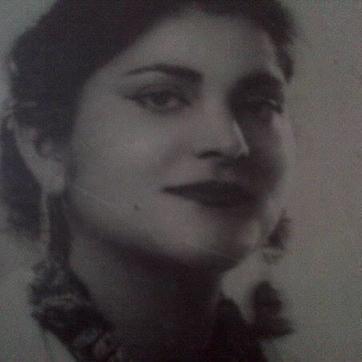
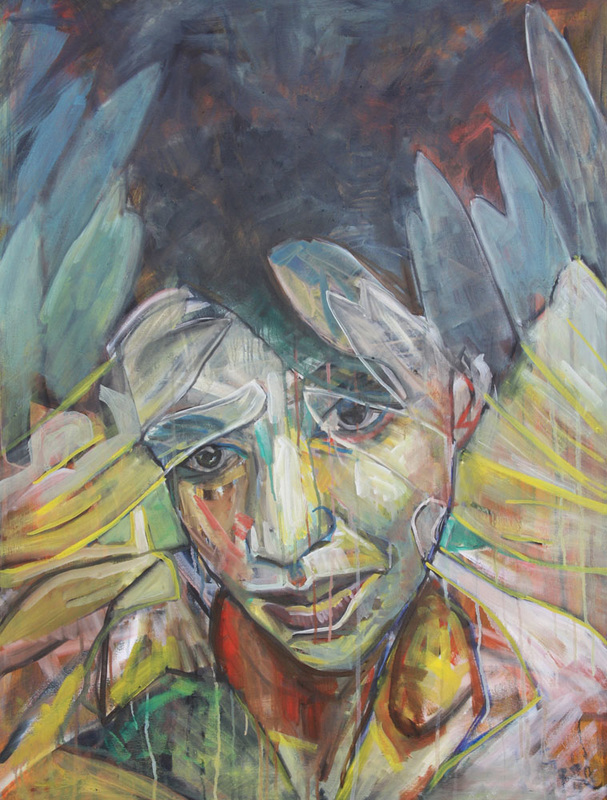
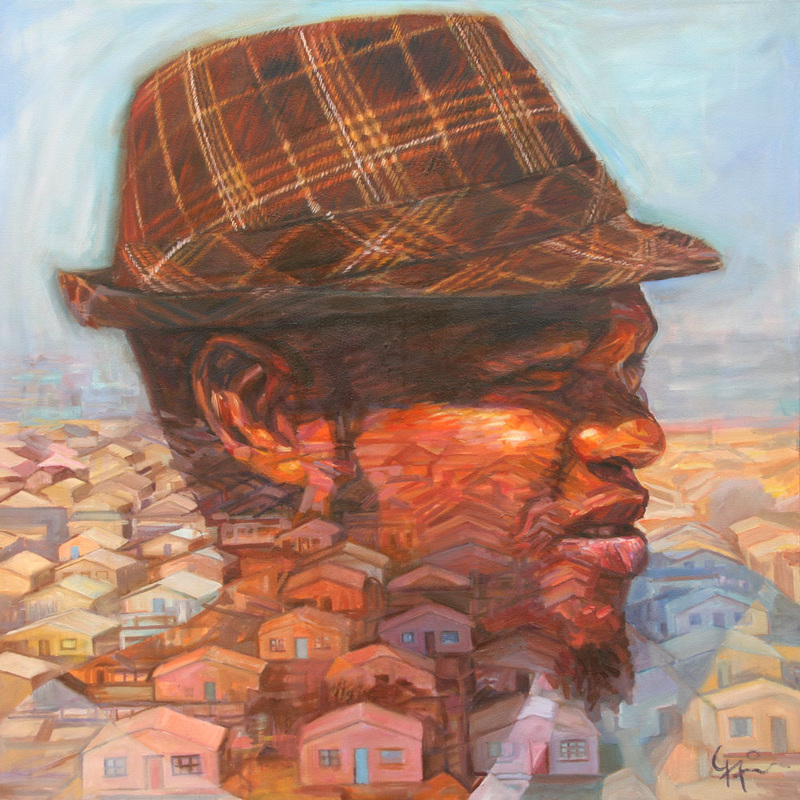

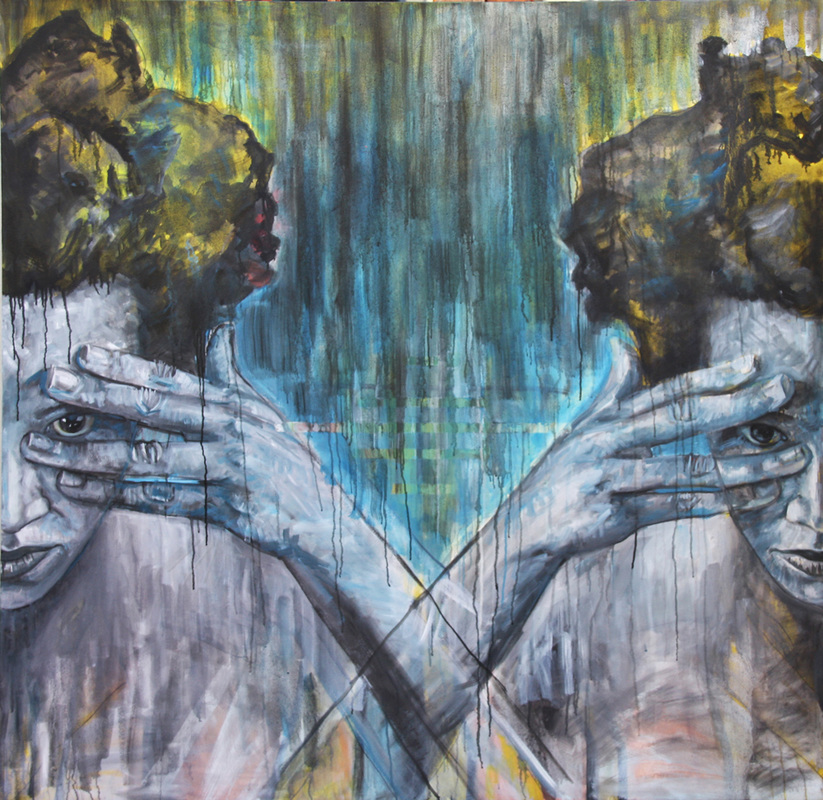
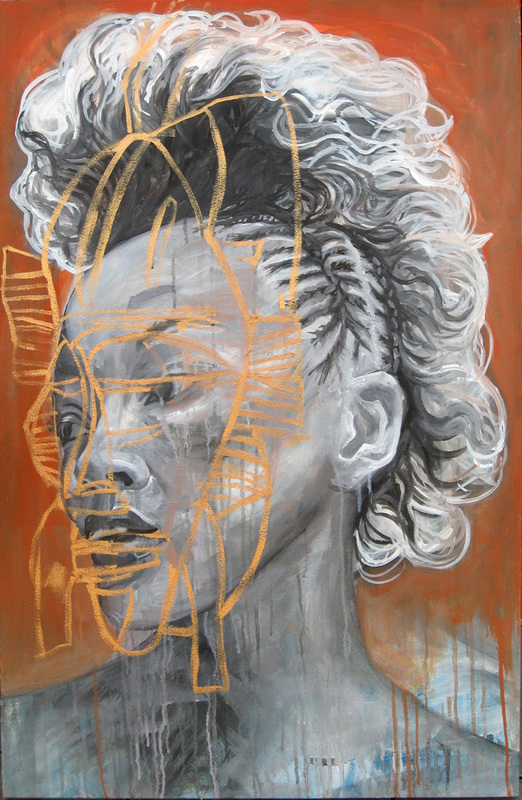
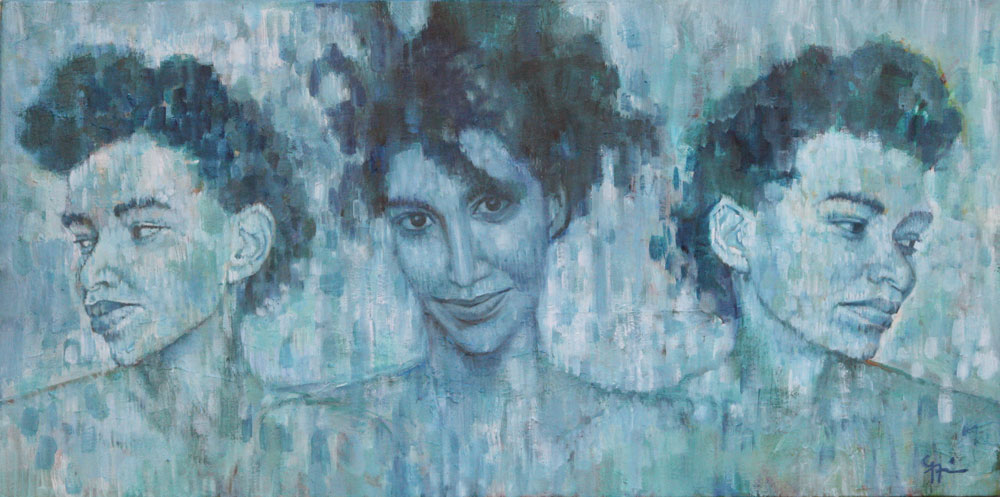
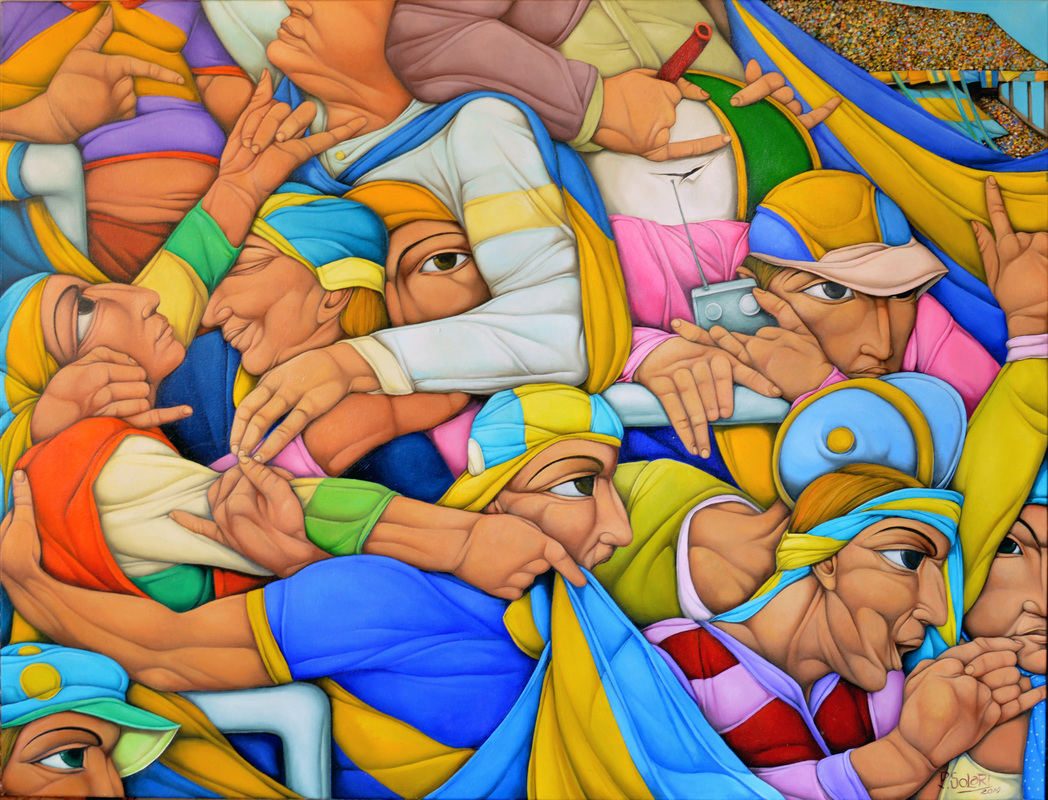
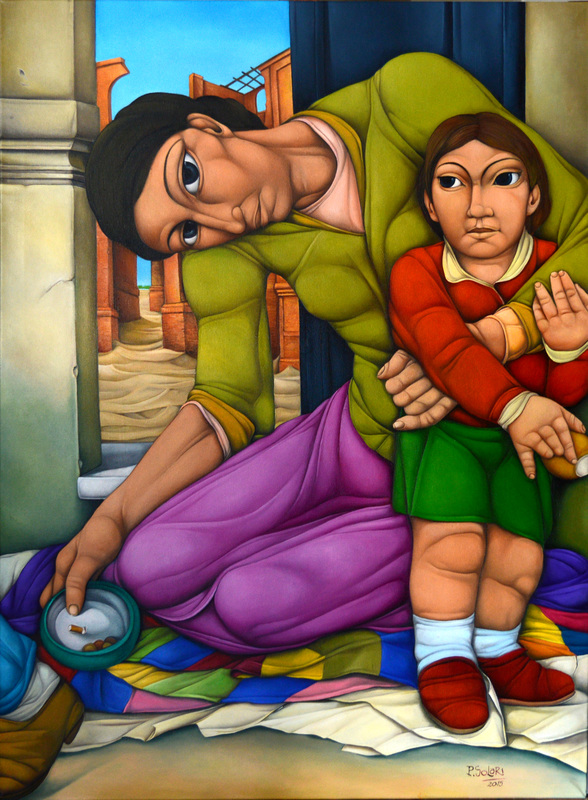
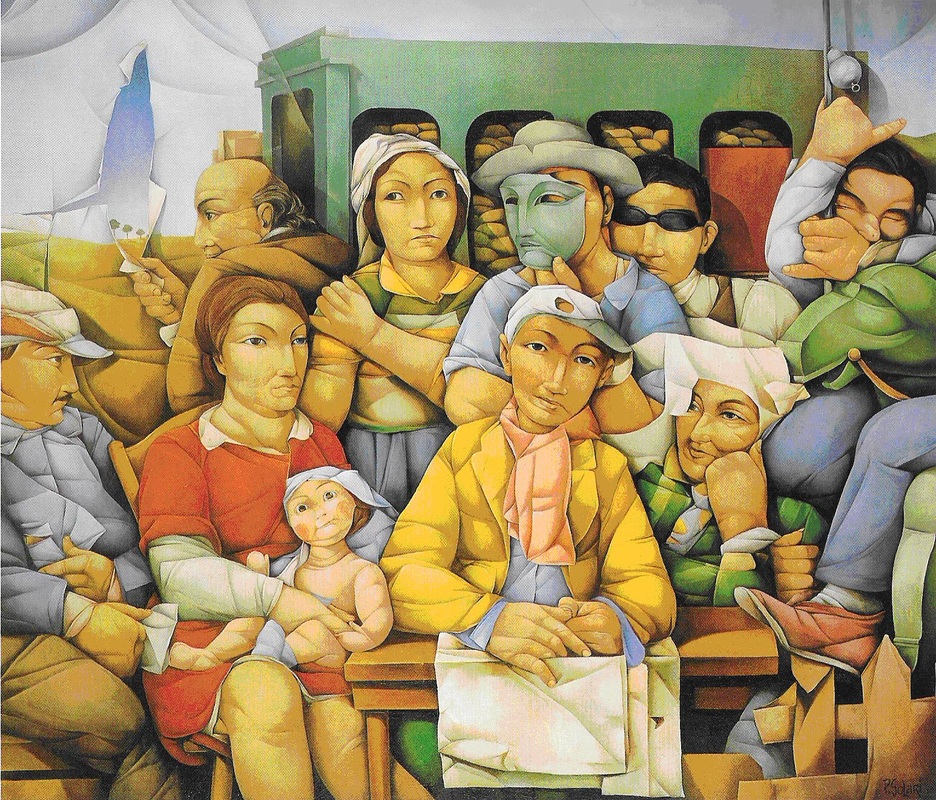

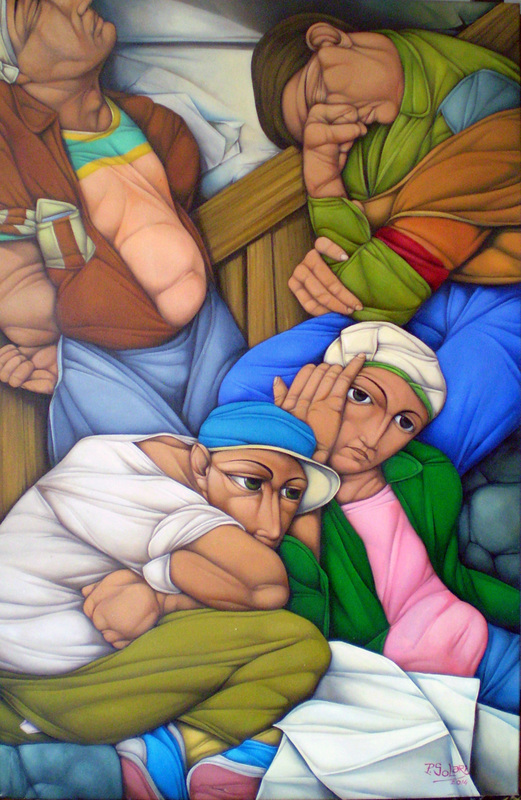
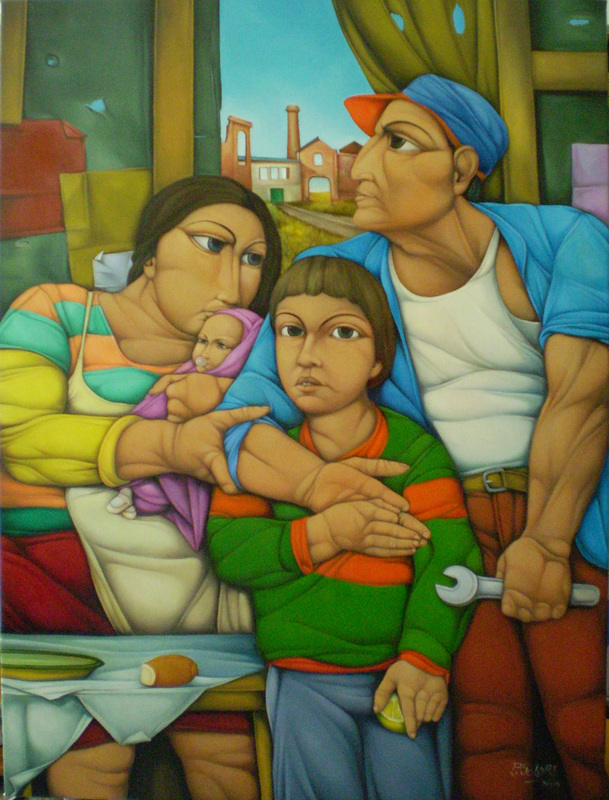

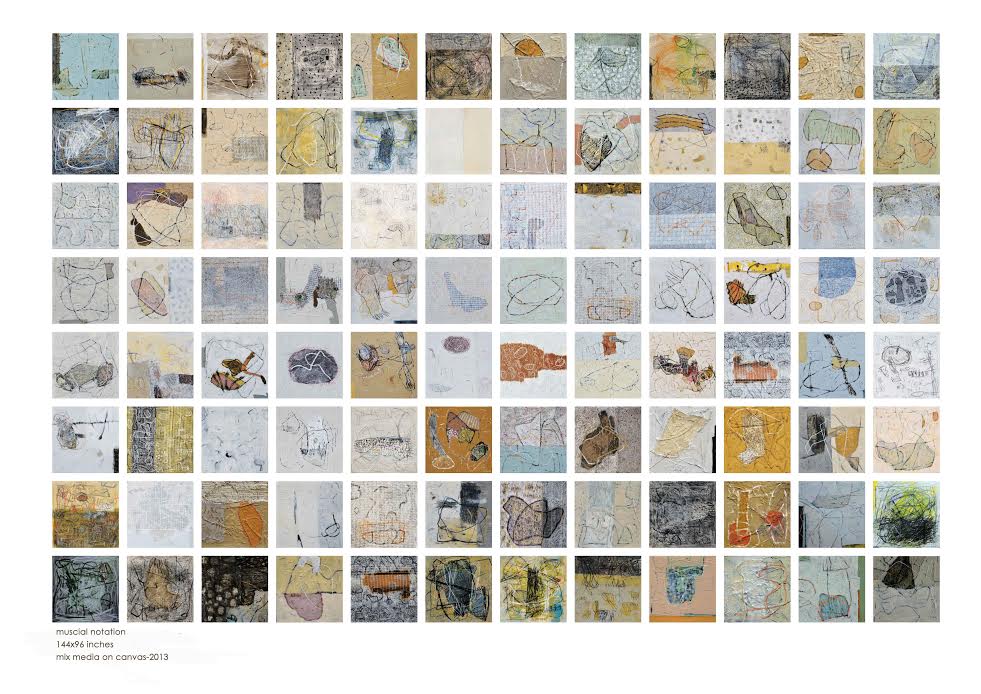
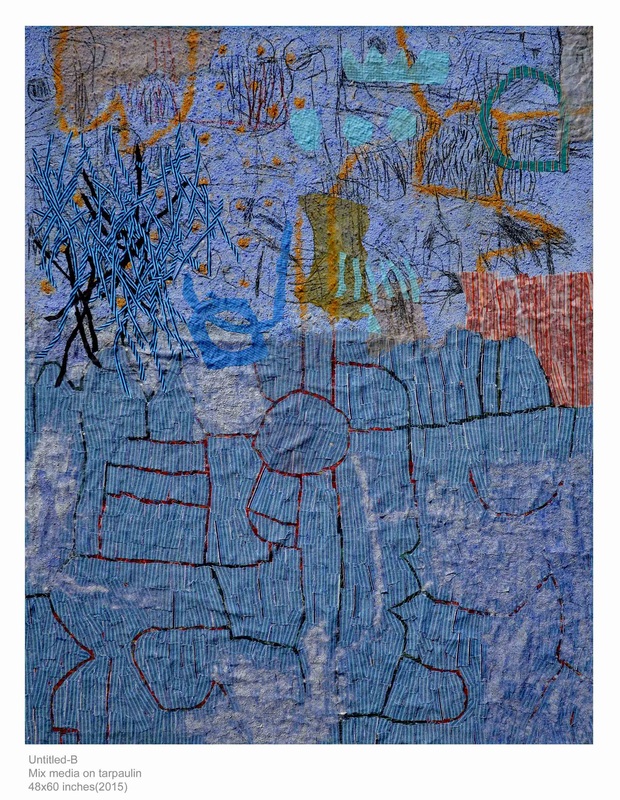
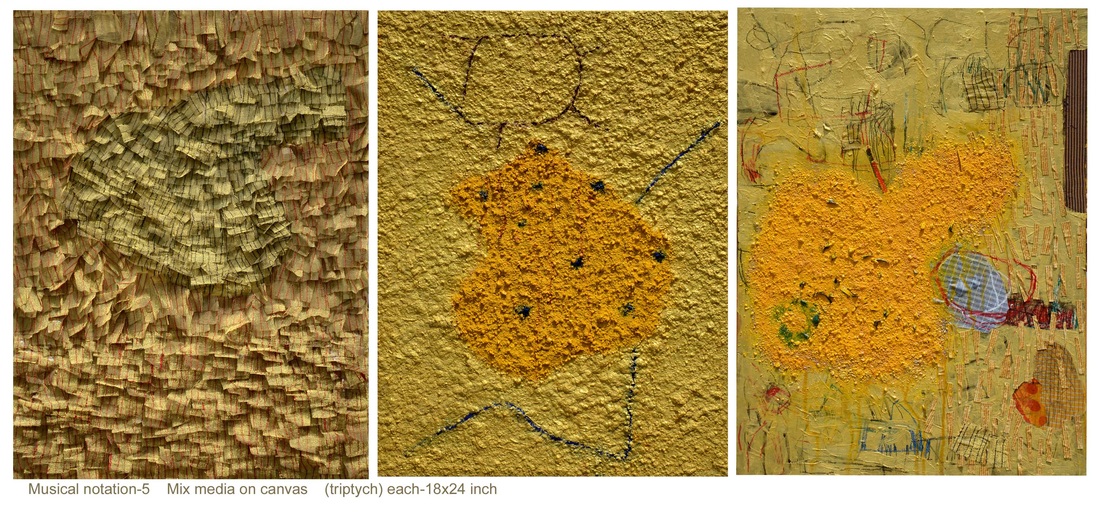
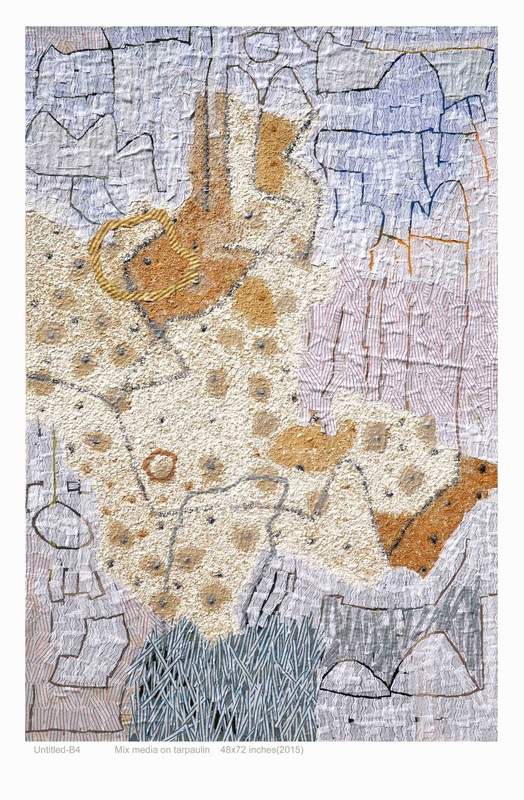
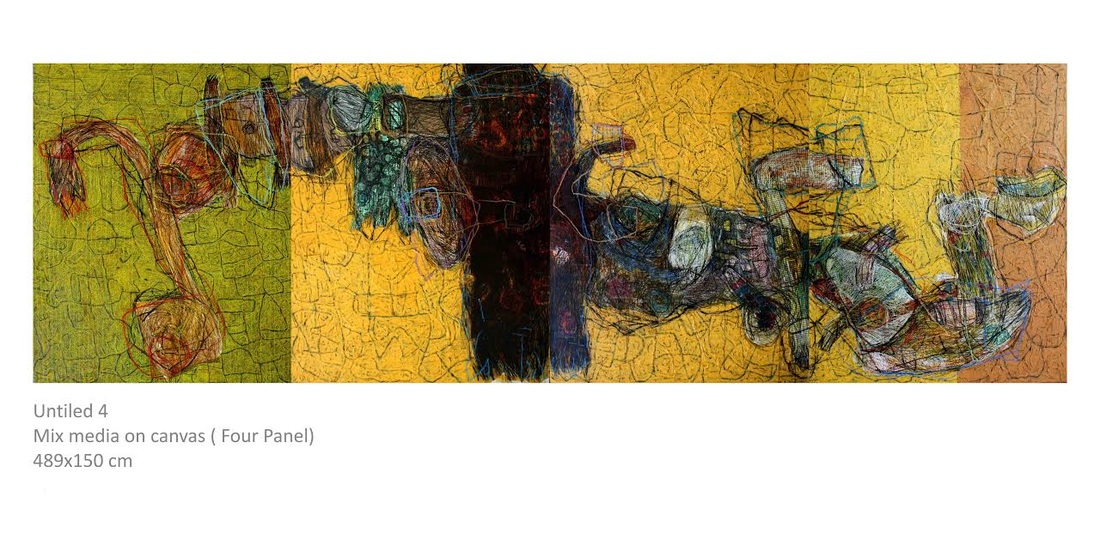
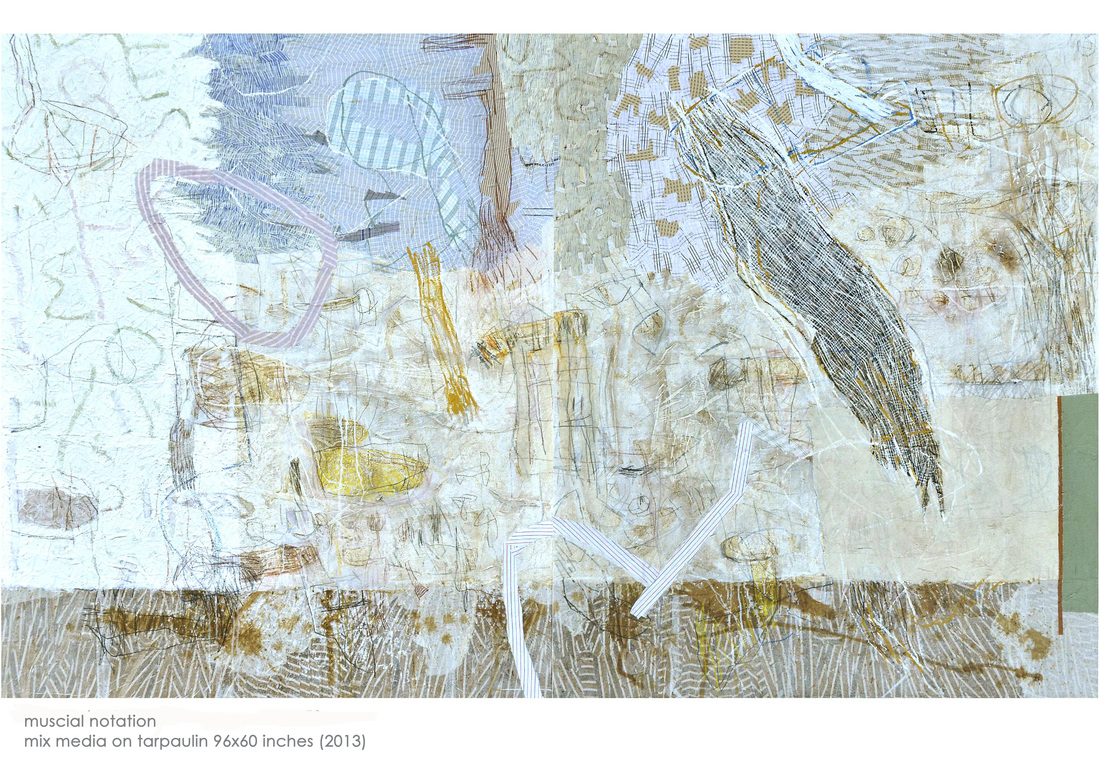
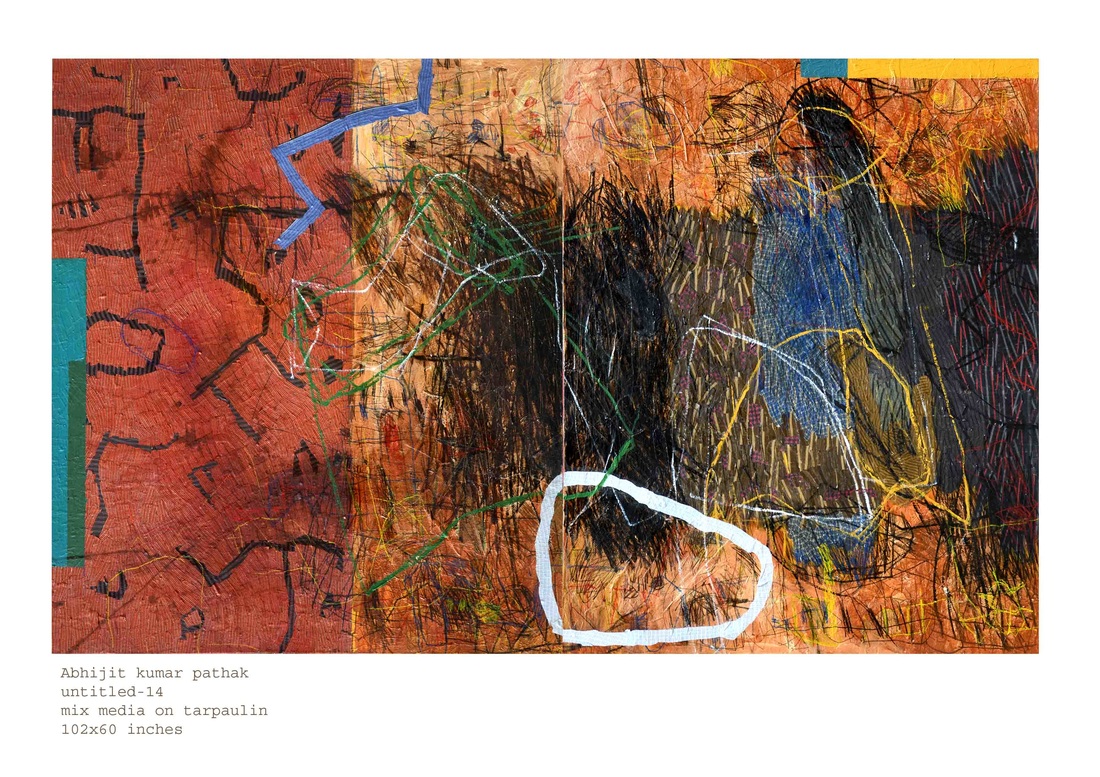
 RSS Feed
RSS Feed